What is Jensen Huang trying to build?

At some point, you have to believe something. We've reinvented computing as we know it. What is the vision for what you see coming next? We asked ourselves, if it can do this, how far can it go?
How do we get from the robots that we have now to the future world that you see? Cleo, everything that moves will be robotic someday, and it will be soon.
We invested tens of billions of dollars before it really happened. No, that's very good, you did some research! But the big breakthrough, I would say, is when we...
That's Jensen Huang, and whether you know it or not, his decisions are shaping your future. He's the CEO of NVIDIA, the company that skyrocketed over the past few years to become one of the most valuable companies in the world because they led a fundamental shift in how computers work, unleashing this current explosion of what's possible with technology.
NVIDIA has done it again! We found ourselves being one of the most important technology companies in the world, and potentially ever. A huge amount of the most futuristic tech that you're hearing about in AI, robotics, gaming, and self-driving cars, and breakthrough medical research relies on new chips and software designed by him and his company.
During the dozens of background interviews that I did to prepare for this, what struck me most was how much Jensen Huang has already influenced all of our lives over the last 30 years, and how many said it's just the beginning of something even bigger.
We all need to know what he's building and why, and most importantly, what he's trying to build next. Welcome to Huge Conversations.
The goal of this Huge Conversation

Thank you so much for doing this. I'm so happy to do it. Before we dive in, I wanted to tell you how this interview is going to be a little bit different than other interviews I've seen you do recently. Okay!
I'm not going to ask you any questions about company finances. Thank you! I'm not going to ask you questions about your management style or why you don't like one-on-ones.
I'm not going to ask you about regulations or politics. I think all of those things are important, but I think that our audience can get them well covered elsewhere. Okay.
What we do on Huge If True is we make optimistic explainer videos, and we've covered... I'm the worst person to be in an explainer video. I think you might be the best, and I think that's what I'm really hoping that we can do together.
It's to make a joint explainer video about how we can actually use technology to make the future better. Yeah. And we do it because we believe that when people see those better futures, they help build them.
So the people that you're going to be talking to are awesome. They are optimists who want to build those better futures, but because we cover so many different topics—we've covered supersonic planes, quantum computers, and particle colliders—it means that millions of people come into every episode without any prior knowledge whatsoever.
You might be talking to an expert in their field who doesn't know the difference between a CPU and a GPU, or a 12-year-old who might grow up one day to be you but is just starting to learn.
For my part, I've now been preparing for this interview for several months, including doing background conversations with many members of your team, but I'm not an engineer. So my goal is to help that audience see the future that you see, so I'm going to ask about three areas.
The first is, how did we get here? What were the key insights that led to this big fundamental shift in computing that we're in now?
The second is, what's actually happening right now?How did those insights lead to the world that we're now living in that seems like so much is going on all at once?
And the third is, what is the vision for what you see coming next?
How did we get here?

In order to talk about this big moment we're in with AI, I think we need to go back to video games in the '90s. At the time, I know game developers wanted to create more realistic-looking graphics, but the hardware couldn't keep up with all of that necessary math.
NVIDIA came up with a solution that would change not just games but computing itself. Could you take us back there and explain what was happening and what were the insights that led you and the NVIDIA team to create the first modern GPU?
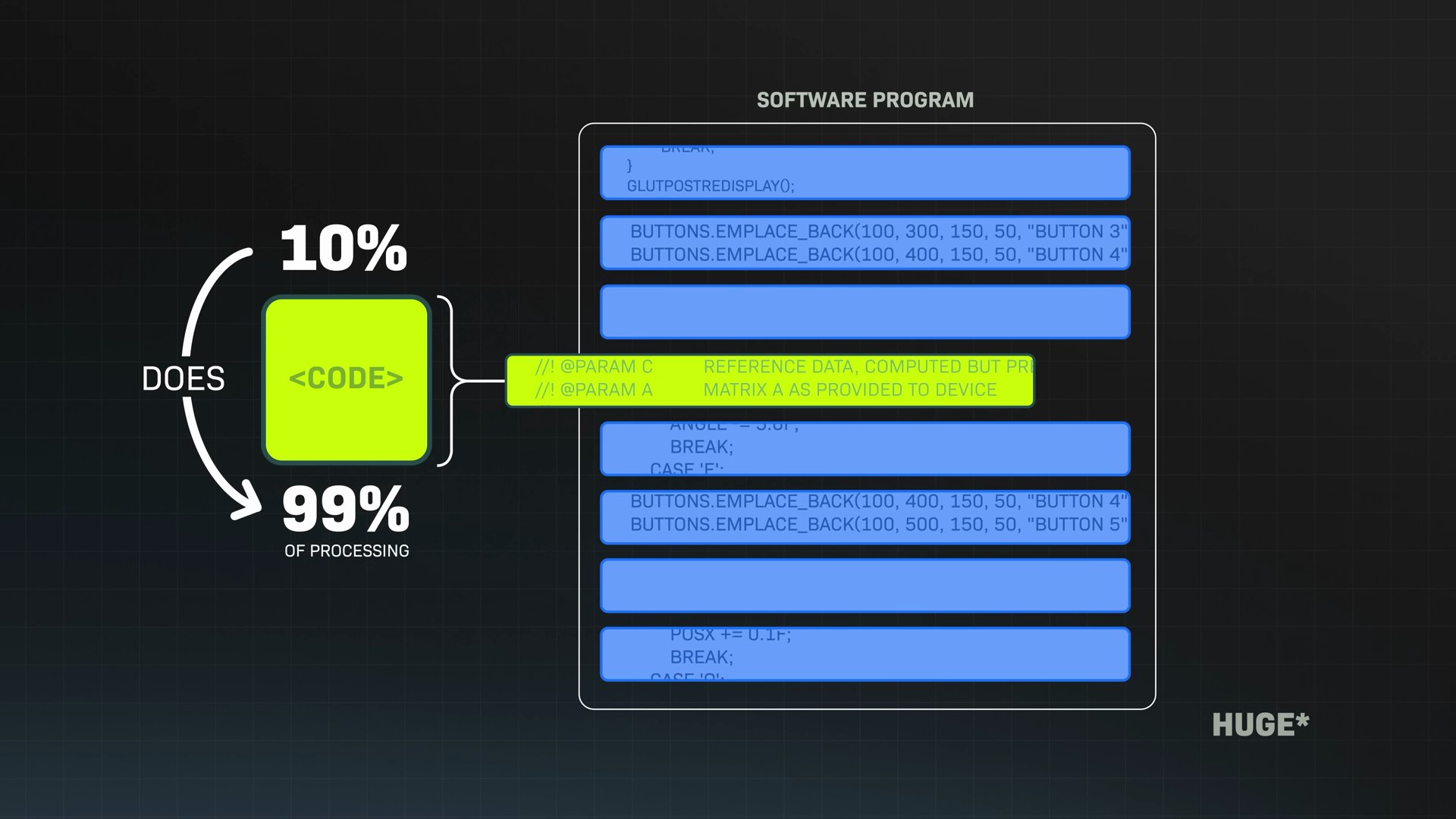
So in the early '90s, when we first started the company, we observed that in a software program, inside it, there are just a few lines of code. Maybe 10% of the code does 99% of the processing, and that 99% of the processing could be done in parallel.
However, the other 90% of the code has to be done sequentially. It turns out that the proper computer, the perfect computer, is one that could do sequential processing and parallel processing, not just one or the other.
What is a GPU?
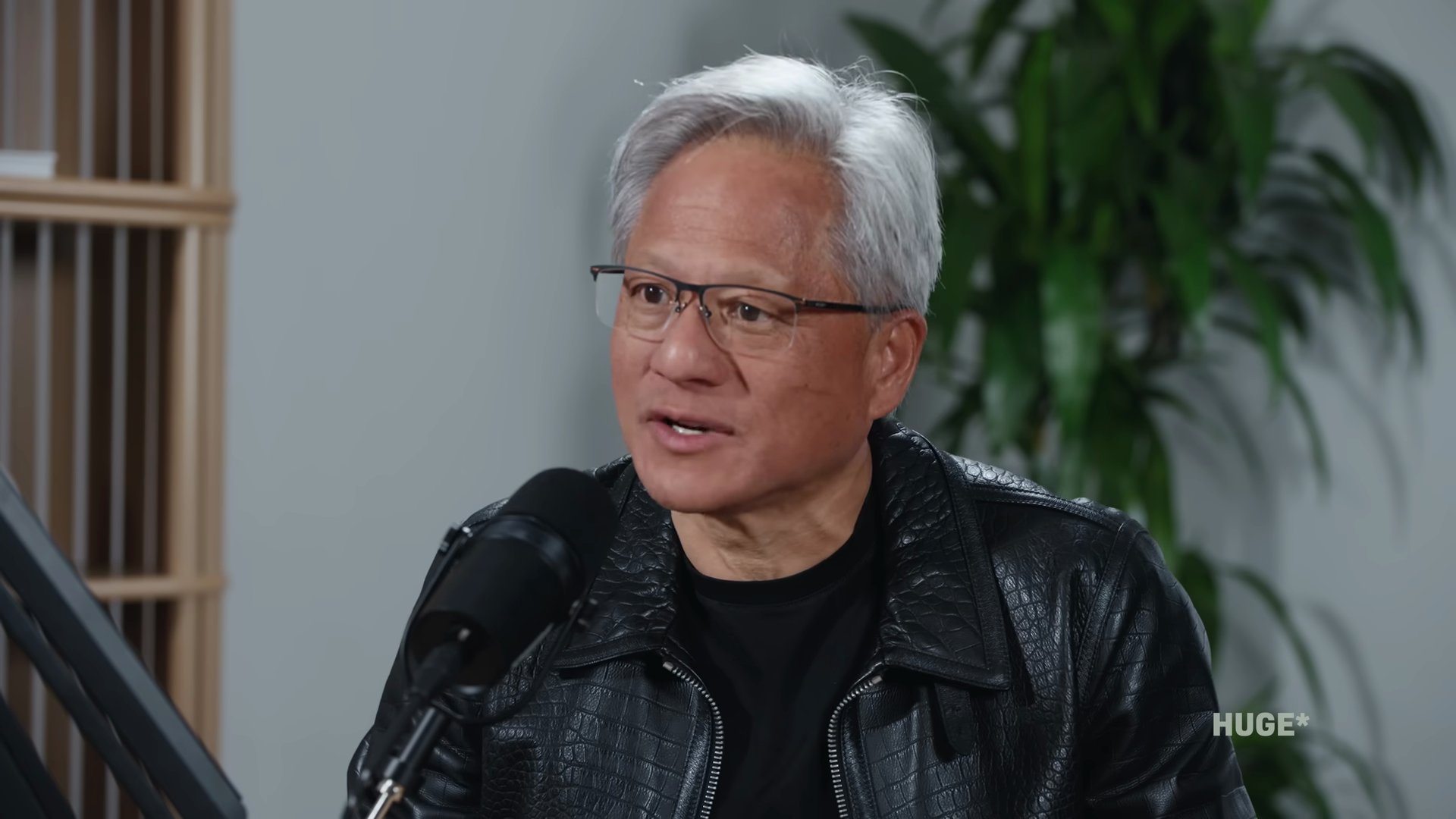
That was the big observation, and we set out to build a company to solve computer problems that normal computers can't. And that's really the beginning of NVIDIA.
My favorite visual of why a CPU versus a GPU really matters so much is a 15-year-old video on the NVIDIA YouTube channel where the Mythbusters use a little robot shooting paintballs one by one to show solving problems one at a time, or sequential processing on a CPU.
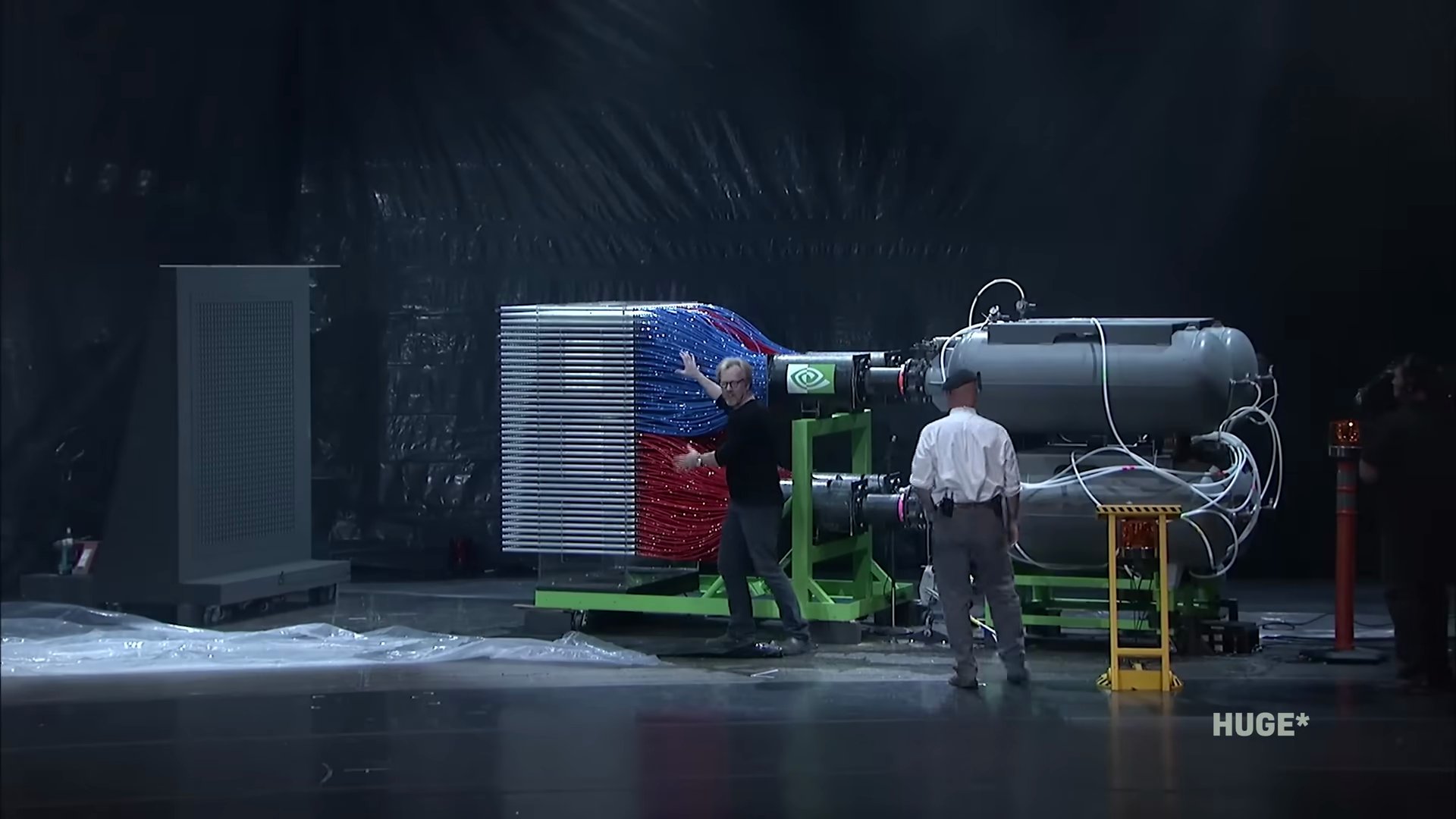
But then they roll out this huge robot that shoots all of the paintballs at once, doing smaller problems all at the same time, or parallel processing on a GPU. Three, two, one!
Why video games first?

So NVIDIA unlocks all of this new power for video games. Why gaming first?
Video games require parallel processing for processing 3D graphics. And we chose video games because, one, we loved the application—it's a simulation of virtual worlds, and who doesn't want to go to virtual worlds?
We had the good observation that video games have the potential to be the largest market for entertainment ever, and it turned out to be true.
Having it be a large market is important because the technology is complicated, and if we had a large market, our R&D budget could be large; we could create new technology. That flywheel between technology and market and greater technology was really the flywheel that got NVIDIA to become one of the most important technology companies in the world. It was all because of video games.
I've heard you say that GPUs were a time machine. Yeah. Could you tell me more about what you meant by that?
A GPU is like a time machine because it lets you see the future sooner.
One of the most amazing things anybody's ever said to me was a quantum chemistry scientist. He said, Jensen, because of NVIDIA's work, I can do my life's work in my lifetime. That's time travel.
He was able to do something that was beyond his lifetime within his lifetime, and this is because we make applications run so much faster, and you get to see the future. So when you're doing weather prediction, for example, you're seeing the future.
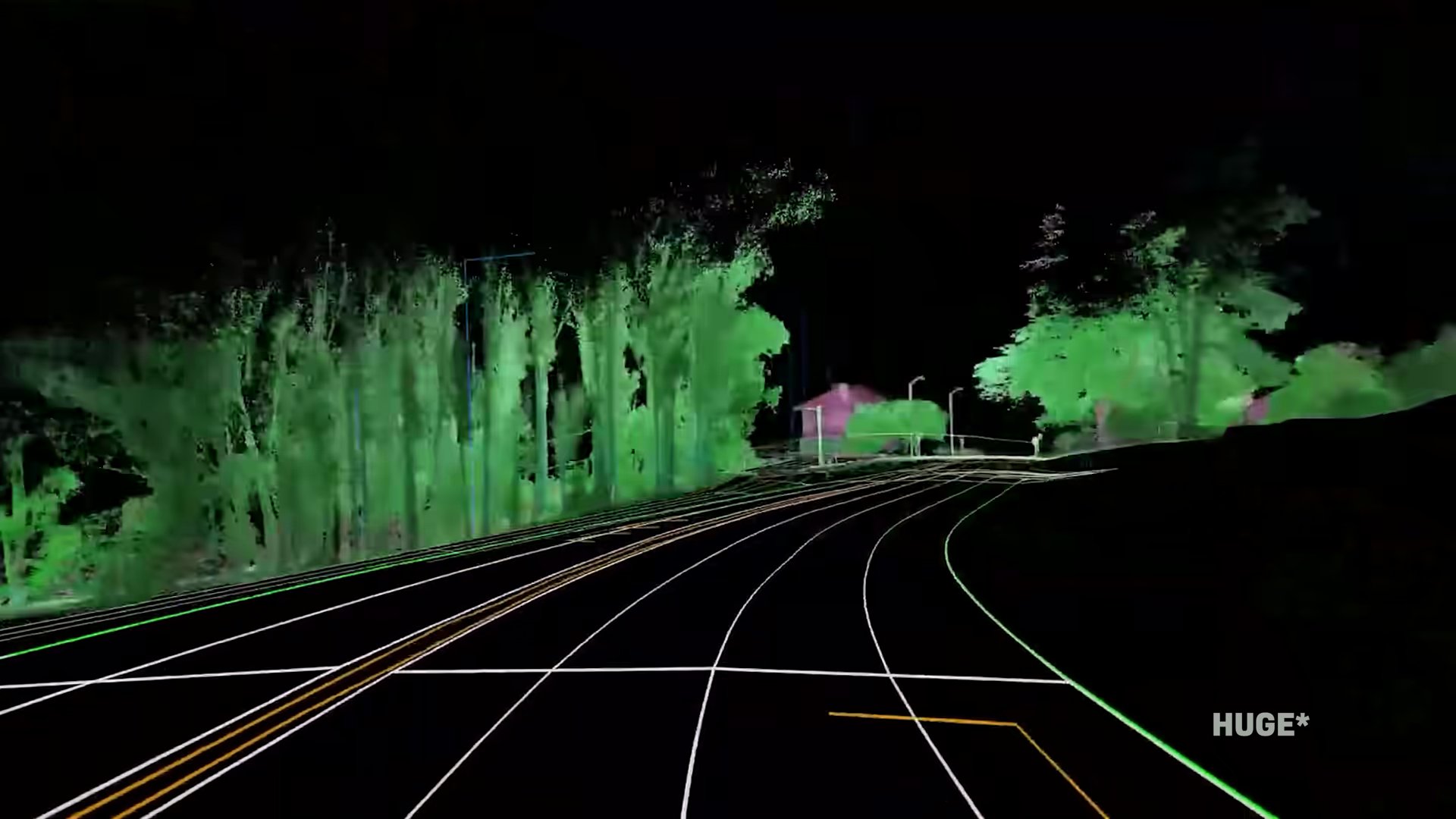
When you're doing a simulation, a virtual city with virtual traffic, and we're simulating our self-driving car through that virtual city, we're doing time travel.
So parallel processing takes off in gaming, and it's allowing us to create worlds in computers that we never could have before. Gaming is sort of this first incredible case of parallel processing unlocking a lot more power, and then, as you said, people begin to use that power across many different industries.
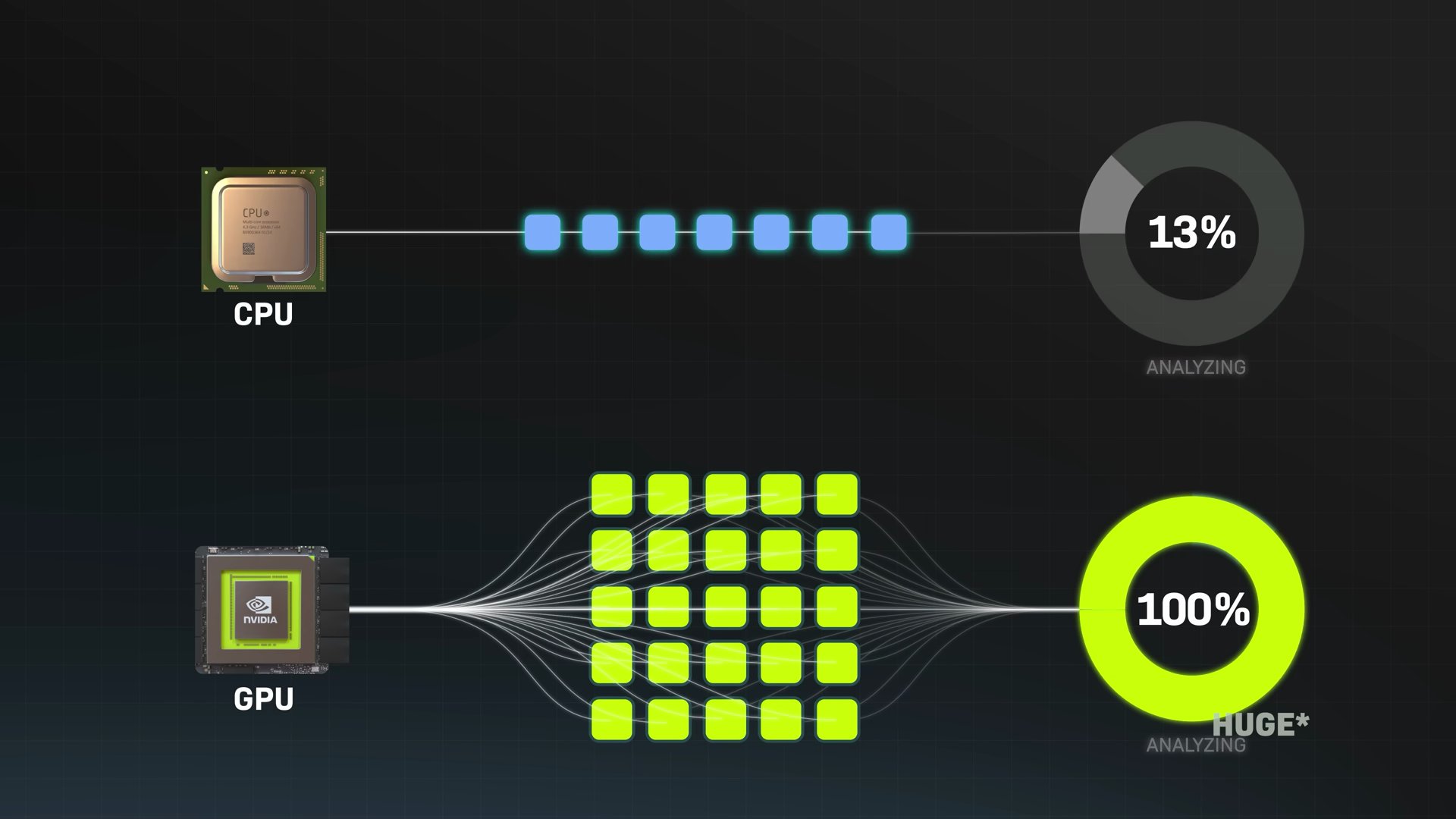
In the case of the quantum chemistry researcher, when I've heard you tell that story, he was running molecular simulations in a way where it was much faster to run in parallel on NVIDIA GPUs, even then, than it was to run them on the supercomputer with the CPU that he had been using before.
Yeah, that's true. So, oh my God, it's revolutionizing all of these other industries as well. It's beginning to change how we see what's possible with computers, and my understanding is that in the early 2000s, you see this and you realize that actually doing that is a little bit difficult. Because what that researcher had to do is he had to sort of trick the GPUs into thinking that his problem was a graphics problem.
That's exactly right. No, that's very good. You did some research. So you create a way to make that a lot easier. That's right.
What is CUDA?
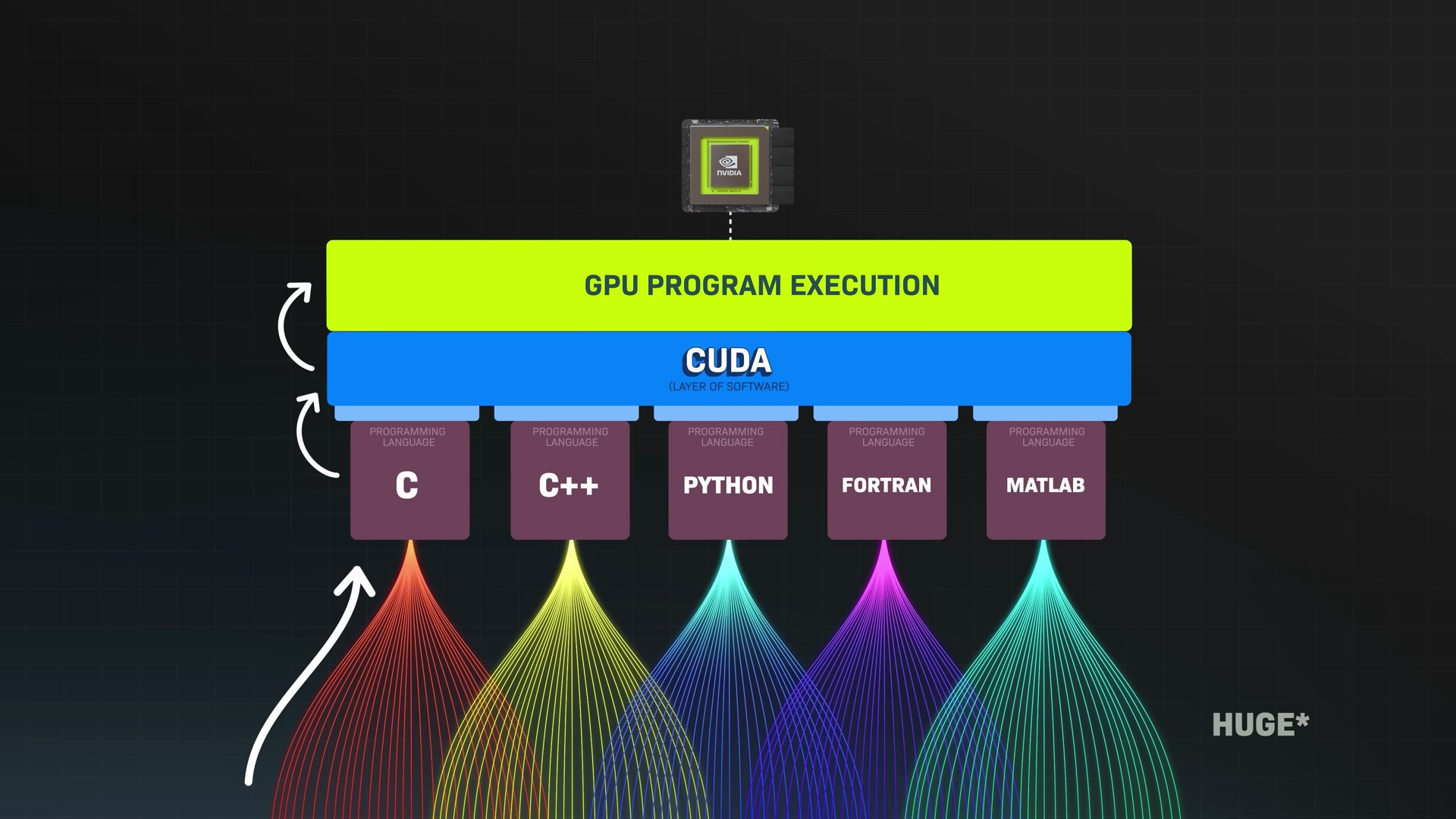
Specifically, it's a platform called CUDA, which lets programmers tell the GPU what to do using programming languages that they already know, like C. That's a big deal because it gives way more people easier access to all of this computing power.
Could you explain what the vision was that led you to create CUDA?
Partly researchers discovering it, partly internal inspiration, and partly solving a problem. You know, a lot of interesting ideas come out of that soup. Some of it is aspiration and inspiration; some of it is just desperation. In the case of CUDA, it's very much the same way.
Probably the first external ideas of using our GPUs for parallel processing emerged out of some interesting work in medical imaging. A couple of researchers at Mass General were using it to do CT reconstruction. They were using our graphics processors for that reason, and it inspired us.
Meanwhile, the problem that we're trying to solve inside our company has to do with the fact that when you're trying to create these virtual worlds for video games, you would like it to be beautiful but also dynamic.

Water should flow like water, and explosions should be like explosions. So there's particle physics you want to do, fluid dynamics you want to do, and that is much harder to do if your pipeline is only able to do computer graphics. So we have a natural reason to want to do it in the market that we were serving.
Researchers were also horsing around with using our GPUs for general-purpose acceleration, and so there were multiple factors coming together in that soup. When the time came, we decided to do something proper and created CUDA as a result of that.
Fundamentally, the reason why I was certain that CUDA was going to be successful and we put the whole company behind it was because, fundamentally, our GPU was going to be the highest volume parallel processor built in the world because the market of video games was so large, and so this architecture had a good chance of reaching many people.
It has seemed to me like creating CUDA was this incredibly optimistic 'huge if true' thing to do, where you were saying, if we create a way for many more people to use much more computing power, they might create incredible things. And then, of course, it came true; they did.
Why was AlexNet such a big deal?
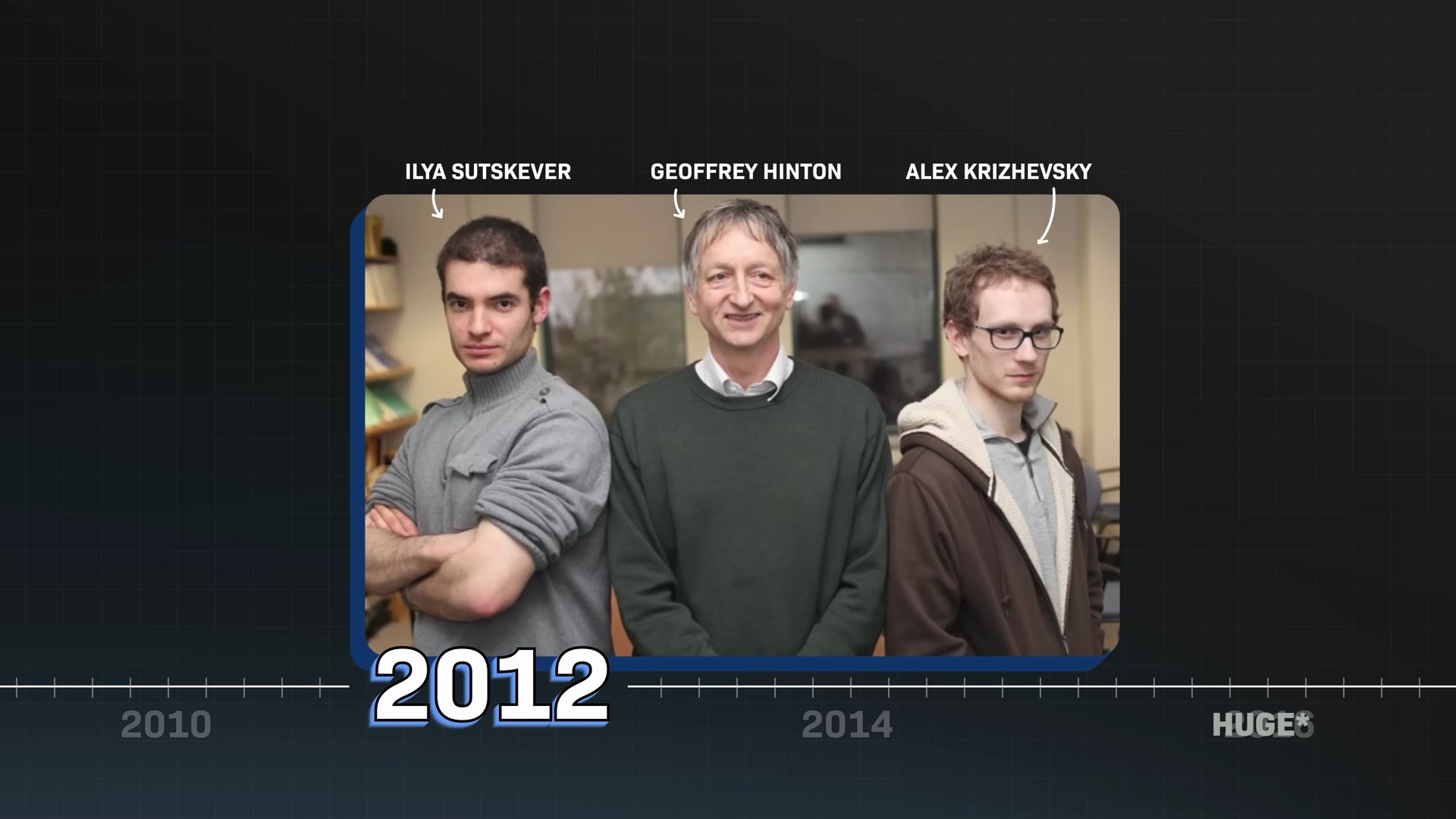
In 2012, a group of three researchers submitted an entry to a famous competition where the goal was to create computer systems that could recognize images and label them with categories. Their entry just crushed the competition; it got way fewer answers wrong. It was incredible; it blew everyone away. It's called AlexNet, and it's a kind of AI called a neural network.
My understanding is one reason it was so good is that they used a huge amount of data to train that system, and they did it on NVIDIA GPUs. All of a sudden, GPUs weren't just a way to make computers faster and more efficient; they were becoming the engines of a whole new way of computing.
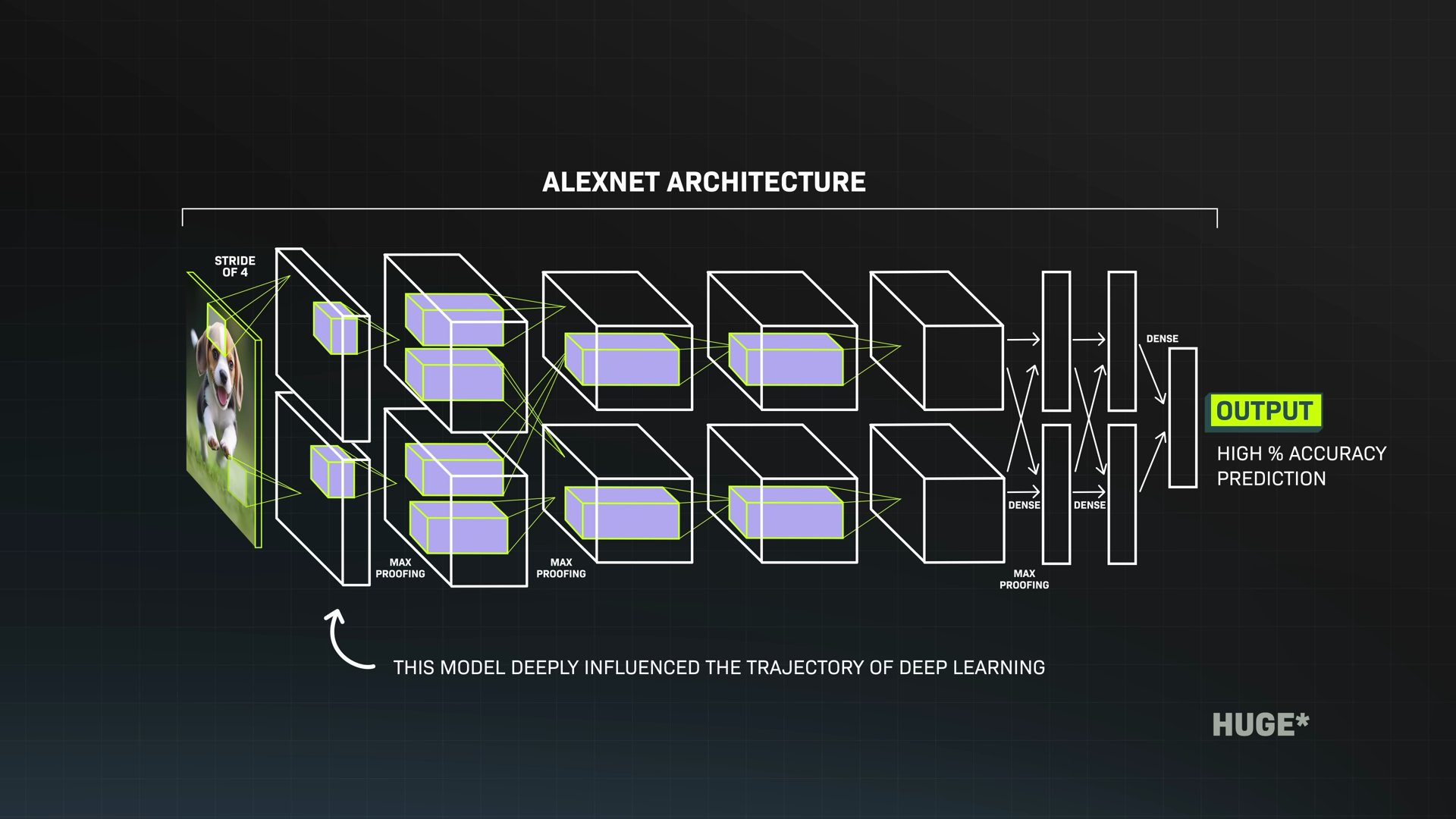
We're moving from instructing computers with step-by-step directions to training computers to learn by showing them a huge number of examples. This moment in 2012 really kicked off this truly seismic shift that we're all seeing with AI right now.
Could you describe what that moment was like from your perspective, and what did you see it would mean for all of our futures?
When you create something new, like CUDA, if you build it, they might not come. That's always the cynic's perspective.
However, the optimist's perspective would say, but if you don't build it, they can't come. That's usually how we look at the world. You know, we have to reason intuitively about why this would be very useful.
And in fact, in 2012, Ilya Sutskever, Alex Krizhevsky, and Geoff Hinton in the University of Toronto , the lab that they were at, they reached out to a GeForce GTX 580 because they learned about CUDA and that CUDA might be able to be used as a parallel processor for training AlexNet.
So our inspiration that GeForce could be the vehicle to bring out this parallel architecture into the world and that researchers would somehow find it someday was a good strategy. It was a strategy based on hope, but it was also reasoned hope.
The thing that really caught our attention was that simultaneously, we were trying to solve the computer vision problem inside the company, and we were trying to get CUDA to be a good computer vision processor.
We were frustrated by a whole bunch of early developments internally with respect to our computer vision effort and getting CUDA to be able to do it. All of a sudden, we saw AlexNet, this new algorithm that is completely different than computer vision algorithms before it, take a giant leap in terms of capability for computer vision.
When we saw that, it was partly out of interest, but partly because we were struggling with something ourselves. So we were highly interested to want to see it work. When we looked at AlexNet, we were inspired by that. But the big breakthrough, I would say, is when we saw AlexNet, we asked ourselves, you know, how far can AlexNet go?
If it can do this with computer vision, how far can it go? If it could go to the limits of what we think it could go, the type of problems it could solve, what would it mean for the computer industry? And what would it mean for the computer architecture?
We rightfully reasoned that if machine learning, if the deep learning architecture can scale, the vast majority of machine learning problems could be represented with deep neural networks.
The type of problems we could solve with machine learning is so vast that it has the potential of reshaping the computer industry altogether, which prompted us to re-engineer the entire computing stack, which is where DGX came from, and this little baby DGX sitting here.
All of this came from that observation that we ought to reinvent the entire computing stack layer by layer. Computers, after 65 years since IBM System/360 introduced modern general-purpose computing, have reinvented computing as we know it. To think about this as a whole story, parallel processing reinvents modern gaming and revolutionizes an entire industry.
Why are we hearing about AI so much now?

Then that way of computing, that parallel processing, begins to be used across different industries. You invest in that by building CUDA, and then CUDA and the use of GPUs allows for a step change in neural networks and machine learning, and begins a revolution that we're now seeing only increase in importance today.
All of a sudden, computer vision is solved. All of a sudden, speech recognition is solved. All of a sudden, language understanding is solved. These incredible problems associated with intelligence, one by one, where we had no solutions for in the past, a desperate desire to have solutions for, all of a sudden one after another get solved every couple of years. It's incredible.
Yeah, so you're seeing that. In 2012, you're looking ahead and believing that that's the future you're going to be living in now, and you're making bets that get you there, really big bets that have very high stakes.
My perception, as a layperson, is that it takes a pretty long time to get there. You make these bets—8 years, 10 years—so my question is, if AlexNet happened in 2012, and this audience is probably seeing and hearing so much more about AI and NVIDIA specifically 10 years later, why did it take a decade?
Also, because you had placed those bets, what did the middle of that decade feel like for you?
Wow, that's a good question. It probably felt like today. You know, to me, there's always some problem, and then there's some reason to be impatient. There's always some reason to be happy about where you are, and there are always many reasons to carry on.
So I think, as I was reflecting a second ago, that sounds like this morning! But I would say that in all things that we pursue, first you have to have core beliefs.
You have to reason from your best principles, and ideally, you're reasoning from principles of either physics or a deep understanding of the industry, or a deep understanding of the science. Wherever you're reasoning from, you reason from first principles.
At some point, you have to believe something. If those principles don't change and the assumptions don't change, then there's no reason to change your core beliefs. Along the way, there's always some evidence of success and that you're leading in the right direction.
Sometimes, you know, you go a long time without evidence of success, and you might have to course correct a little, but the evidence comes. If you feel like you're going in the right direction, we just keep on going. The question of why we stayed so committed for so long—the answer is actually the opposite: There was no reason not to be committed because we believed it.
I've believed in NVIDIA for 30-plus years, and I'm still here working every single day. There's no fundamental reason for me to change my belief system, and I fundamentally believe that the work we're doing in revolutionizing computing is as true today, even more true today than it was before. So we'll stick with it until otherwise.
There are, of course, very difficult times along the way. When you're investing in something, and nobody else believes in it, and it costs a lot of money, and maybe investors or others would rather you just keep the profit or improve the share price, whatever it is, you have to believe in your future. You have to invest in yourself.
We believe this so deeply that we invested tens of billions of dollars before it really happened. Yeah, it was 10 long years, but it was fun along the way.
What are NVIDIA’s core beliefs?
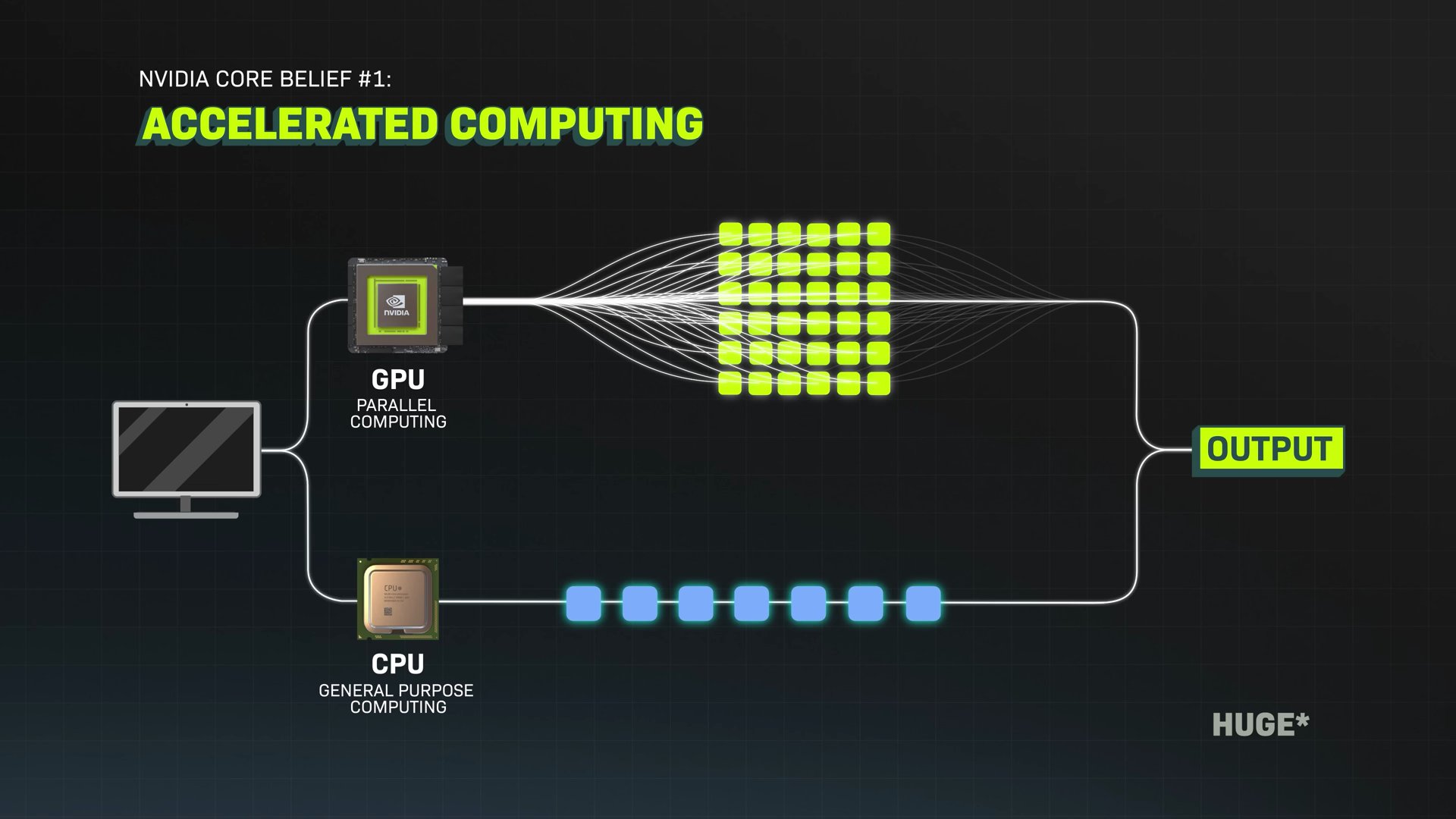
How would you summarize those core beliefs? What is it that you believe about the way computers should work and what they can do for us that keeps you not only coming through that decade but also doing what you're doing now, making bets you're making for the next few decades?
The first core belief was our first discussion: accelerated computing. Parallel computing versus general-purpose computing. We would add two of those processors together, and we would do accelerated computing, and I continue to believe that today.
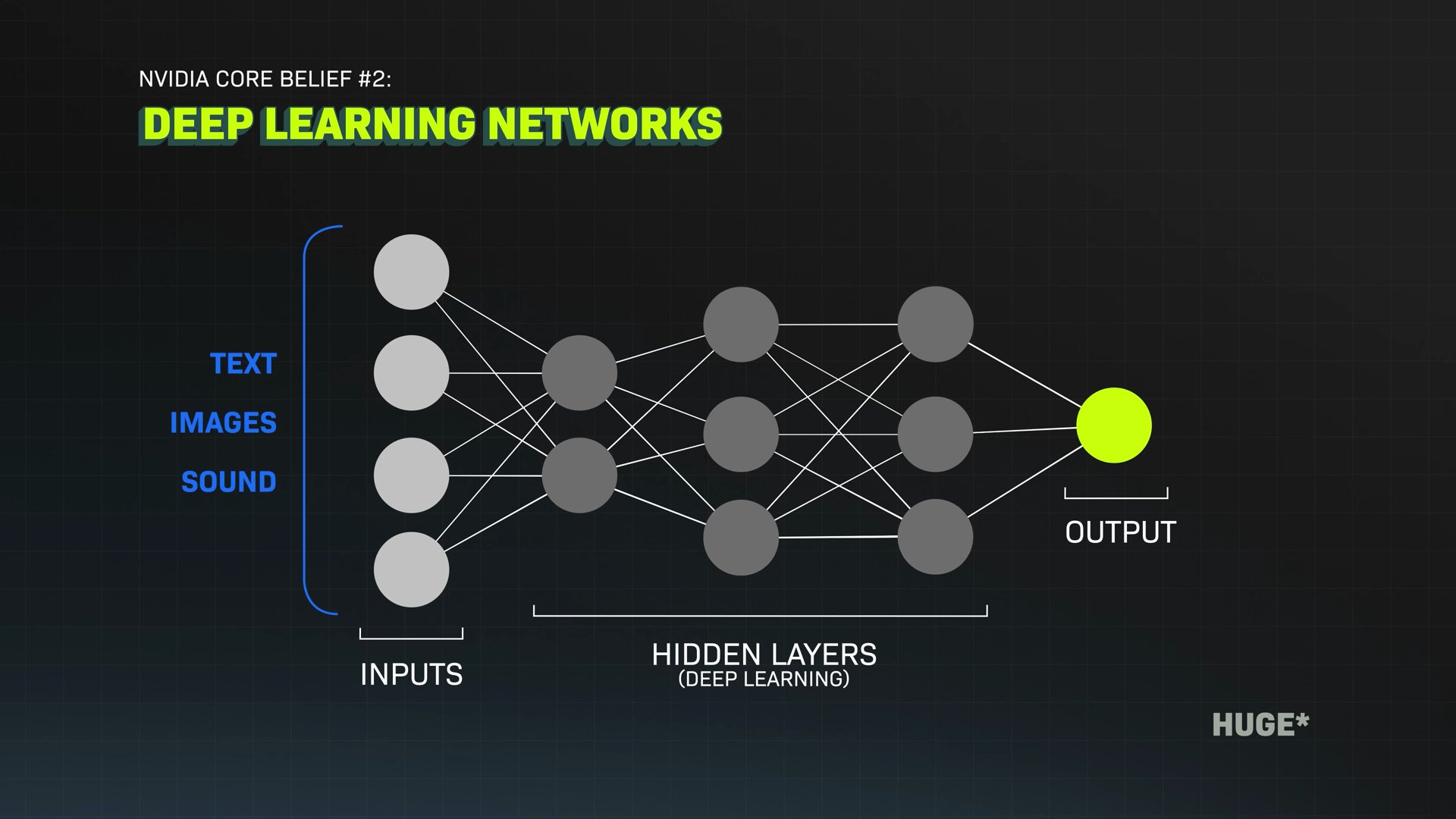
The second was the recognition that these deep learning networks, these DNNs, that came to the public during 2012, these deep neural networks, have the ability to learn patterns and relationships from a whole bunch of different types of data.
It can learn more and more nuanced features if it could be larger and larger, make them deeper and deeper, or wider and wider. So the scalability of the architecture is empirically true. The fact that model size and data size being larger and larger means you can learn more knowledge is also true, empirically true.
So if that's the case, what are the limits? Unless there's a physical limit or an architectural limit or mathematical limit, and it was never found, we believe that you could scale it. The only other question is, what can you learn from data? What can you learn from experience? Data is basically digital versions of human experience.
So what can you learn? You obviously can learn object recognition from images. You can learn speech from just listening to sound. You can even learn languages and vocabulary, and syntax, and grammar, and all just by studying a whole bunch of letters and words.
So we've now demonstrated that AI or deep learning has the ability to learn almost any modality of data, and it can translate to any modality of data.
And so what does that mean? You can go from text to text, summarize a paragraph. You can go from text to text, translate from language to language. You can go from text to images; that's image generation. You can go from images to text; that's captioning.
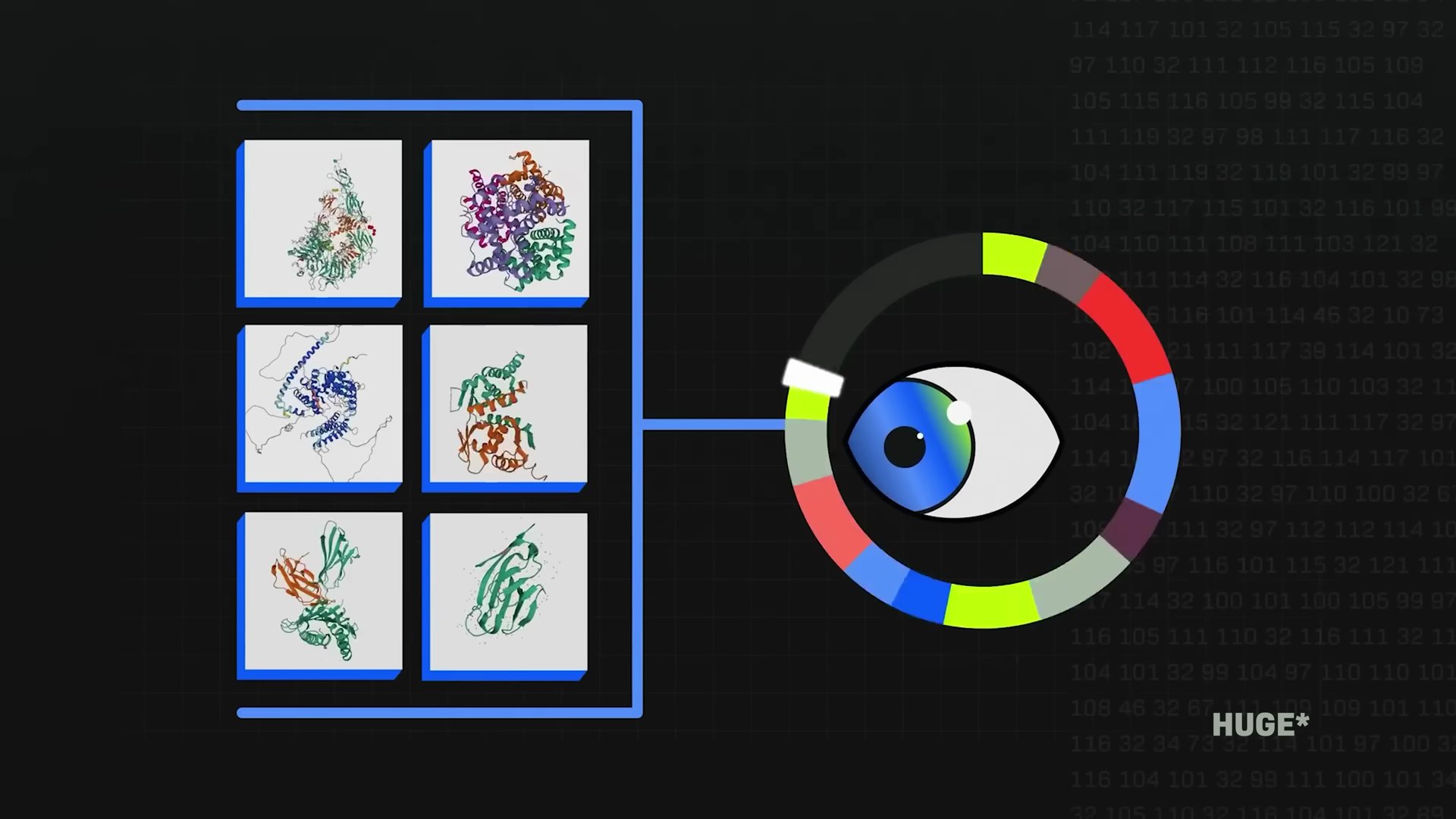
You can even go from amino acid sequences to protein structures. In the future, you'll go from protein to words: "What does this protein do?" or "Give me an example of a protein that has these properties." You know, identifying a drug target.
So you could just see that all of these problems are around the corner to be solved. You can go from words to video. Why can't you go from words to action tokens for a robot? From the computer's perspective, how is it any different? It opened up this universe of opportunities and a universe of problems that we can go solve. That gets us quite excited!
Why does this moment feel so different?

It feels like we are on the cusp of this truly enormous change. When I think about the next 10 years, unlike the last 10 years, I know we've gone through a lot of change already, but I don't think I can predict anymore how I will be using the technology that is currently being developed.
That's exactly right. I think the last 10 years were really about the science of AI. The next 10 years, we're going to have plenty of science of AI, but the next 10 years is going to be the application science of AI, the fundamental science versus the application science.
So the applied research, the application side of AI, now becomes, how can I apply AI to digital biology? How can I apply AI to climate technology? How can I apply AI to agriculture, to fishery, to robotics, to transportation, optimizing logistics? How can I apply AI to teaching? How do I apply AI to podcasting, right?
I'd love to choose a couple of those to help people see how this fundamental change in computing that we've been talking about is actually going to change their experience of their lives, how they're actually going to use technology that is based on everything we just talked about.
What’s the future of robots?
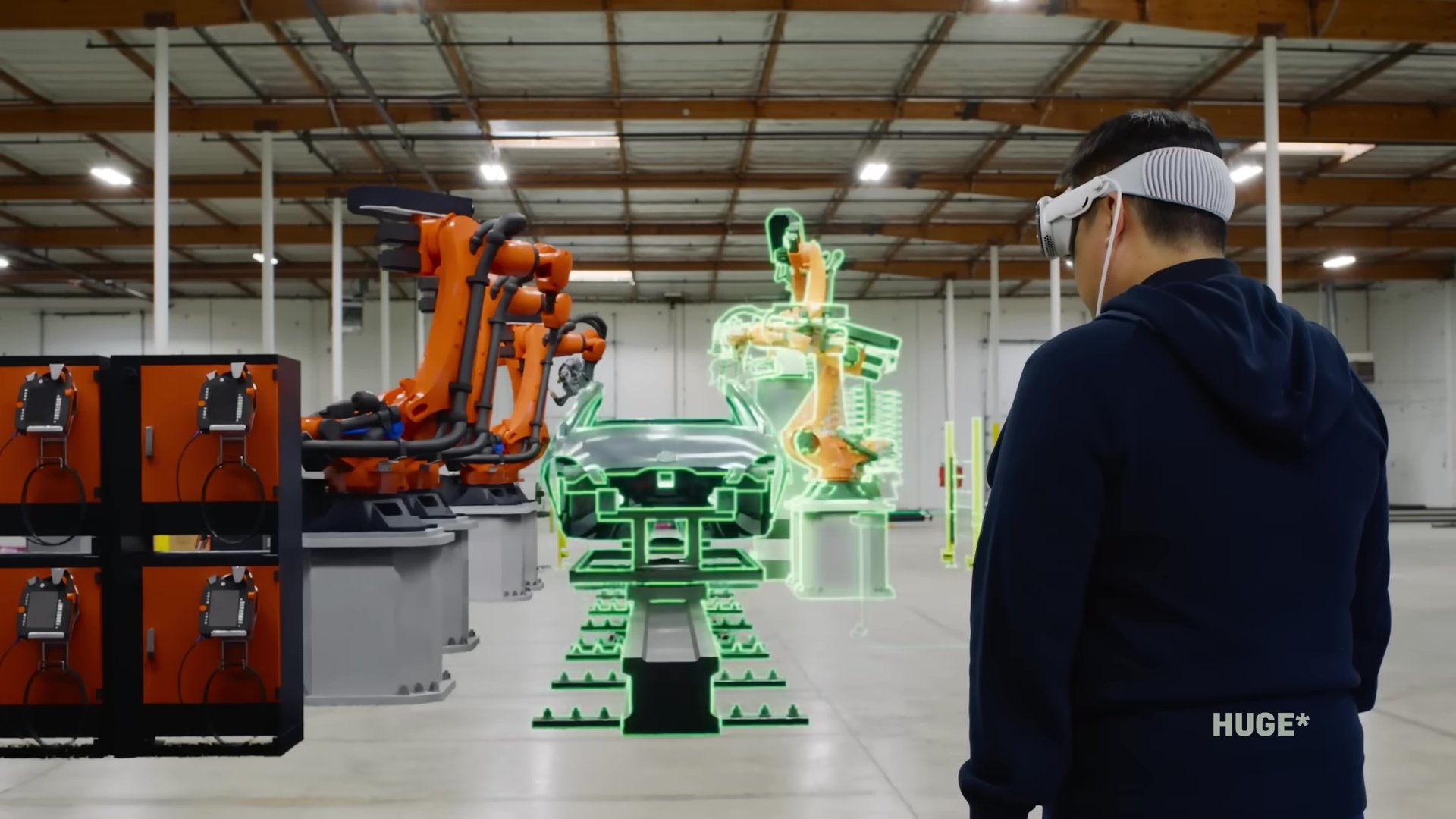
One of the things that I've now heard you talk a lot about, and I have a particular interest in, is physical AI. In other words, robots—my friends—meaning humanoid robots, but also robots like self-driving cars and smart buildings, autonomous warehouses, autonomous lawnmowers, or more.
From what I understand, we might be about to see a huge leap in what all of these robots are capable of because we're changing how we train them. Up until recently, you've either had to train your robot in the real world, where it could get damaged or wear down, or you could get data from fairly limited sources like humans in motion capture suits.
But that means that robots aren't getting as many examples as they'd need to learn more quickly. Now we're starting to train robots in digital worlds, which means way more repetitions a day, way more conditions, learning way faster.
So we could be in a big bang moment for robots right now, and NVIDIA is building tools to make that happen.
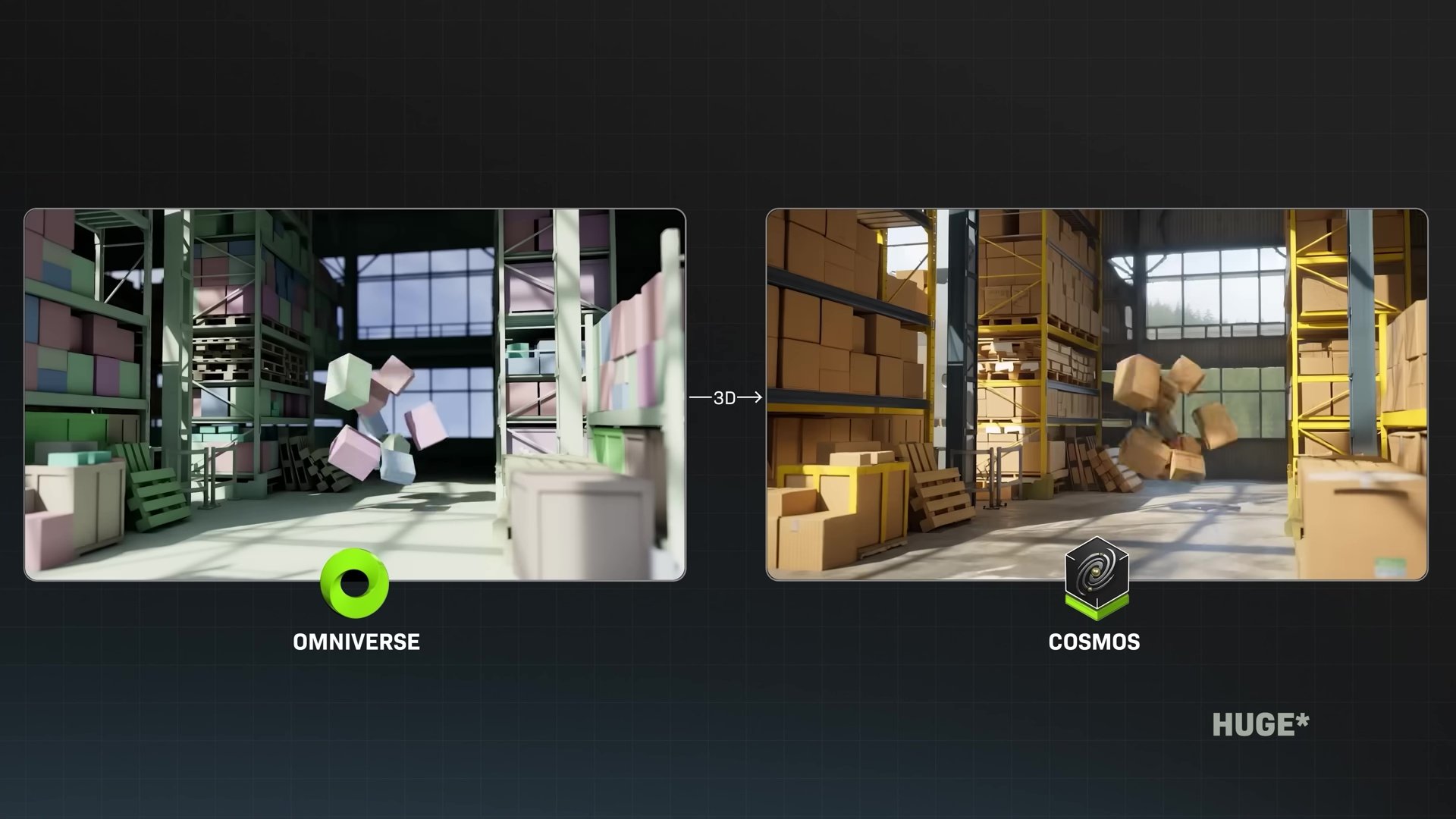
You have Omniverse, and my understanding is this is 3D worlds that help train robotic systems so that they don't need to train in the physical world. That's exactly right.
You just announced Cosmos, which is ways to make that 3D universe much more realistic. So you can get all kinds of different scenarios. If we're training something on this table, many different kinds of lighting on the table, many different times of day, many different experiences for the robot to go through, so that it can get even more out of Omniverse.
As a kid who grew up loving Data on Star Trek, Isaac Asimov's books, and just dreaming about a future with robots, how do we get from the robots that we have now to the future world that you see of robotics?
Let me use language models, maybe ChatGPT, as a reference for understanding Omniverse and Cosmos.
First of all, when ChatGPT first came out, it was extraordinary, and it has the ability to basically generate text from your prompt. However, as amazing as it was, it has the tendency to hallucinate if it goes on too long or if it pontificates about a topic it is not informed about.
It'll still do a good job generating plausible answers; it just wasn't grounded in the truth, and so people called it hallucination. The next generation, shortly, it had the ability to be conditioned by context, so you could upload your PDF, and now it's grounded by the PDF. The PDF becomes the ground truth.
It could actually look up search, and then the search becomes its ground truth, and between that, it could reason about how to produce the answer that you're asking for. The first part is generative AI, and the second part is ground truth. Okay, and so now let's come into the physical world.
The world model: we need a foundation model, just like ChatGPT had a core foundation model that was the breakthrough in order for robotics to be smart about the physical world. It has to understand things like gravity, friction, inertia, geometric and spatial awareness.
It has to understand that an object is sitting there even when I looked away. When I come back, it's still sitting there—object permanence. It has to understand cause and effect. If I tip it, it'll fall over.
So these kinds of physical common sense, if you will, have to be captured or encoded into a world foundation model so that the AI has world common sense.
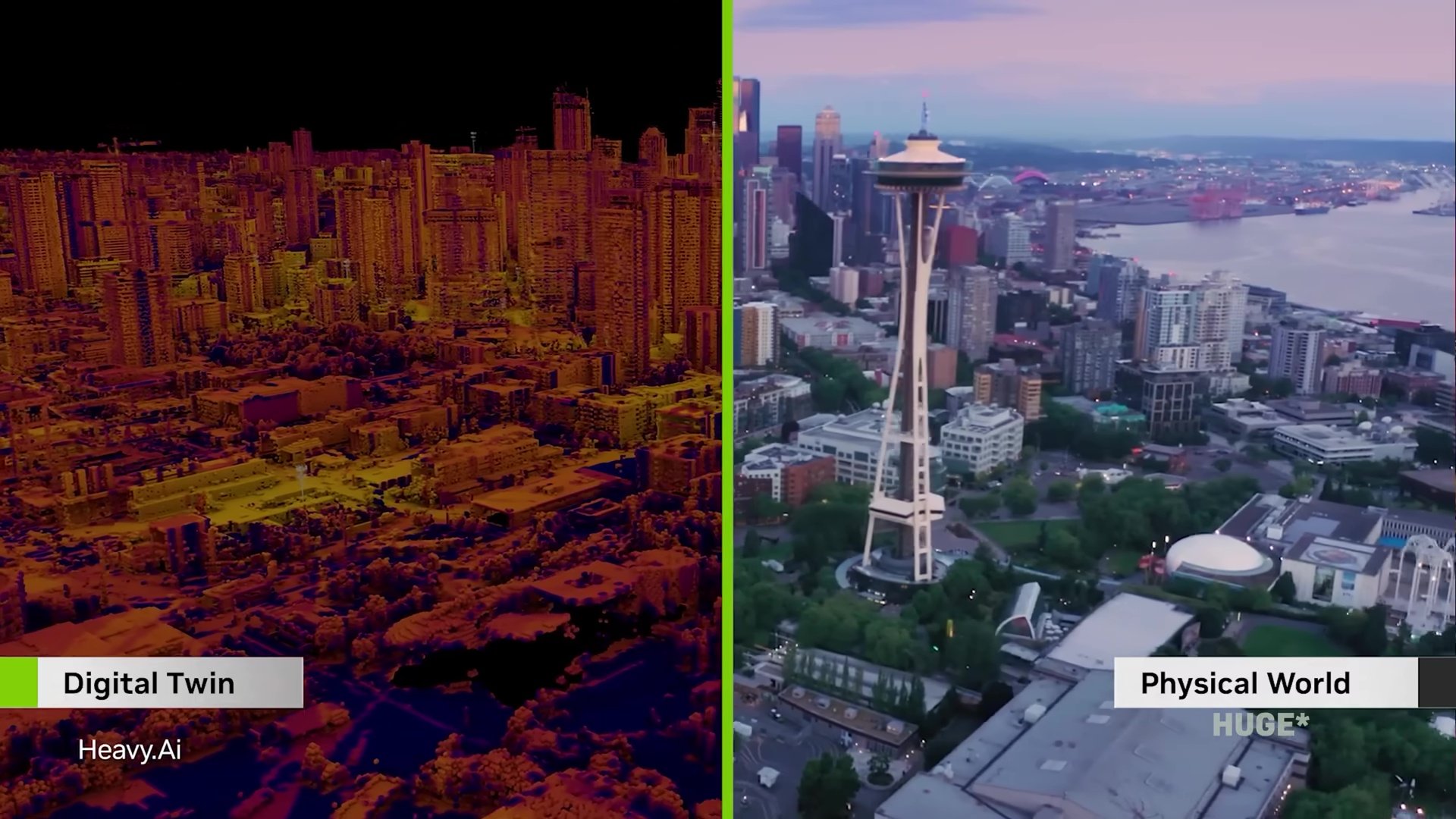
Okay, so somebody has to go create that, and that's what we did with Cosmos. We created a world language model, just like ChatGPT was a language model; this is a world model.
The second thing we have to do is the same thing we did with PDFs and context, grounding it with ground truth. So the way we augment Cosmos with ground truth is with physical simulations because Omniverse uses physics simulation, which is based on principled solvers.
The mathematics is Newtonian physics; it's the math we know, all of the fundamental laws of physics we've understood for a very long time, and it's encoded into, captured into Omniverse. That's why Omniverse is a simulator.
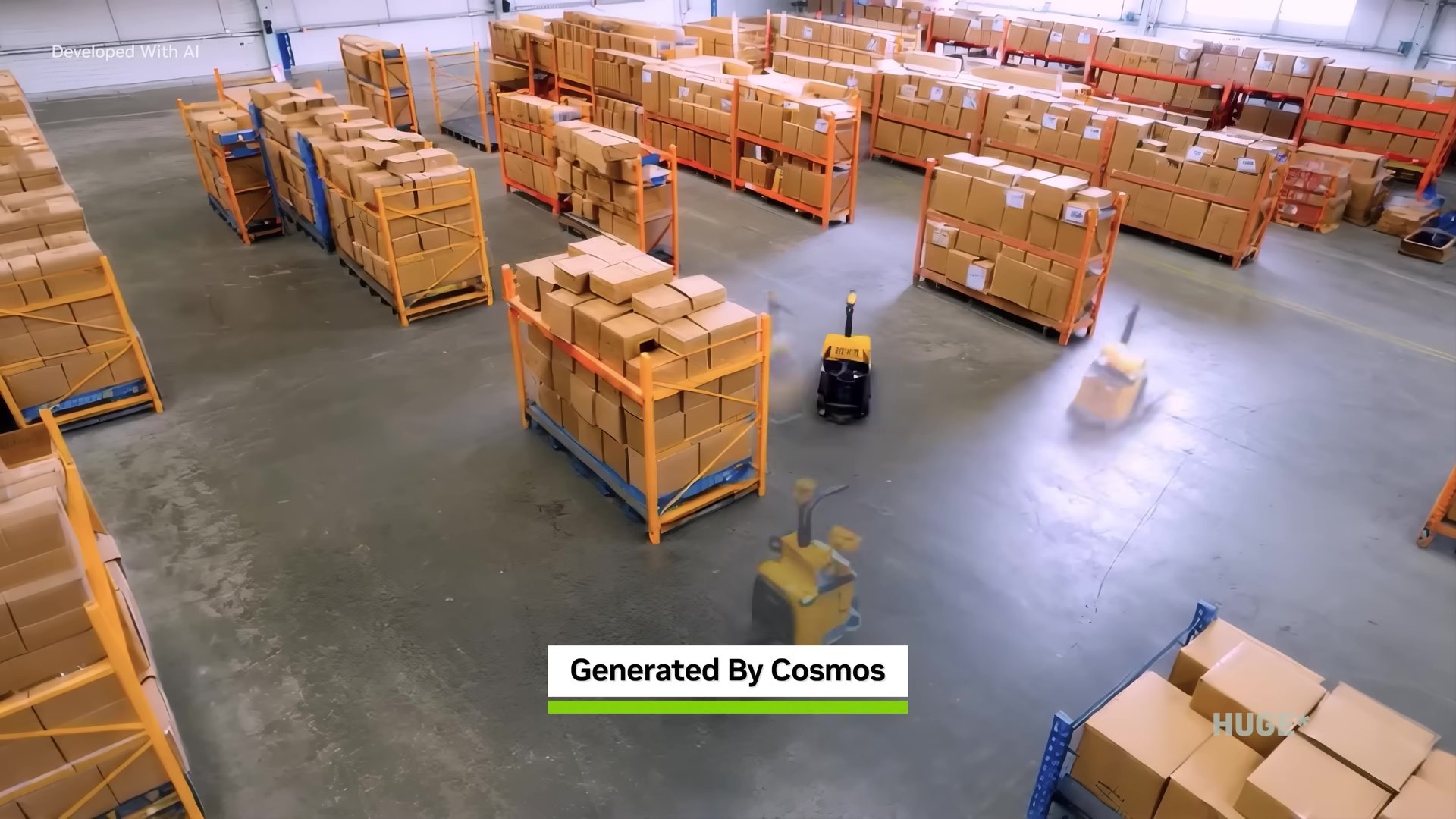
Using the simulator to ground or to condition Cosmos, we can now generate an infinite number of stories of the future, and they're grounded on physical truth.
Just like between PDF or search plus ChatGPT, we can generate an infinite amount of interesting things, answer a whole bunch of interesting questions. The combination of Omniverse plus Cosmos, you could do that for the physical world.
So to illustrate this for the audience, if you had a robot in a factory and you wanted to make it learn every route that it could take, instead of manually going through all of those routes, which could take days and could be a lot of wear and tear on the robot, we're now able to simulate all of them digitally in a fraction of the time and in many different situations that the robot might face—it's dark, it's blocked, etc.—so the robot is now learning much faster. It seems to me like the future might look very different than today.
What is Jensen’s 10-year vision?

If you play this out 10 years, how do you see people actually interacting with this technology in the near future?
Cleo, everything that moves will be robotic someday, and it will be soon.
The idea that you'll be pushing around a lawnmower is already kind of silly. Maybe people do it because it's fun, but there's no need to. Every car is going to be robotic. Humanoid robots, the technology necessary to make it possible, is just around the corner.
Everything that moves will be robotic, and they'll learn how to be a robot in Omniverse Cosmos, and we'll generate all these plausible, physically plausible futures, and the robots will learn from them, and then they'll come into the physical world, and it's exactly the same. A future where you're just surrounded by robots is for certain, and I'm just excited about having my own R2-D2.
Of course, R2-D2 wouldn't be quite the can that it is and roll around. It'll probably be a different physical embodiment, but it's always R2. So my R2 is going to go around with me. Sometimes it's in my smart glasses, sometimes it's in my phone, sometimes it's in my PC. It's in my car.
So R2 is with me all the time, including when I get home, where I left a physical version of R2. Whatever that version happens to be, we'll interact with R2. I think the idea that we'll have our own R2-D2 for our entire life, and it grows up with us, that's a certainty now.
What are the biggest concerns?

A lot of news media, when they talk about futures like this, focus on what could go wrong, and that makes sense. There is a lot that could go wrong. We should talk about what could go wrong so we can keep it from going wrong. That's the approach we like to take on the show: what are the big challenges so that we can overcome them?
What buckets do you think about when you're worrying about this future?
Well, there's a whole bunch of stuff that everybody talks about: bias or toxicity, or just hallucination.
Speaking with great confidence about something it knows nothing about, and as a result, we rely on that information. Generating, that's a version of generating fake information, fake news, or fake images, or whatever it is.
Of course, impersonation. It does such a good job pretending to be a human; it could do an incredibly good job pretending to be a specific human.
The spectrum of areas we have to be concerned about is fairly clear, and there are a lot of people who are working on it. Some of the stuff related to AI safety requires deep research and deep engineering, and that's simply it wants to do the right thing; it just didn't perform it right, and as a result, hurt somebody.
For example, a self-driving car that wants to drive nicely and properly, but somehow the sensor broke down or it didn't detect something, or it made an aggressive turn, or whatever it is, it did it poorly. It did it wrongly.
So that's a whole bunch of engineering that has to be done to make sure that AI safety is upheld by making sure that the product functions properly.
Lastly, what happens if the system, the AI, wants to do a good job, but the system failed? Meaning the AI wanted to stop something from happening, and it turned out just when it wanted to do it, the machine broke down.
This is no different than a flight computer inside a plane having three versions of them, so there's triple redundancy inside the system, inside autopilots. Then you have two pilots, and then you have air traffic control, and then you have other pilots watching out for these pilots.
So the AI safety systems have to be architected as a community such that these AIs work and function properly. When they don't function properly, they don't put people in harm's way, and there are sufficient safety and security systems all around them to make sure that we keep AI safe.
So this spectrum of conversation is gigantic, and we have to take the parts apart and build them as engineers.
What are the biggest limitations?

One of the incredible things about this moment we're in right now is that we no longer have a lot of the technological limits that we had in a world of CPUs and sequential processing. We've unlocked not only a new way to do computing but also a way to continue to improve.
Parallel processing has a different kind of physics to it than the improvements that we were able to make on CPUs. I'm curious, what are the scientific or technological limitations that we face now in the current world that you're thinking a lot about?
Well, everything in the end is about how much work you can get done within the limitations of the energy that you have.
That's a physical limit, and the laws of physics about transporting information and transporting bits, flipping bits and transporting bits, at the end of the day, the energy it takes to do that limits what we can get done, and the amount of energy that we have limits what we can get done. We're far from having any fundamental limits that keep us from advancing.
In the meantime, we seek to build better and more energy-efficient computers. This little computer, the big version of it, was $250,000. This is an AI supercomputer. The version that I delivered, this is just a prototype, so it's a mockup.
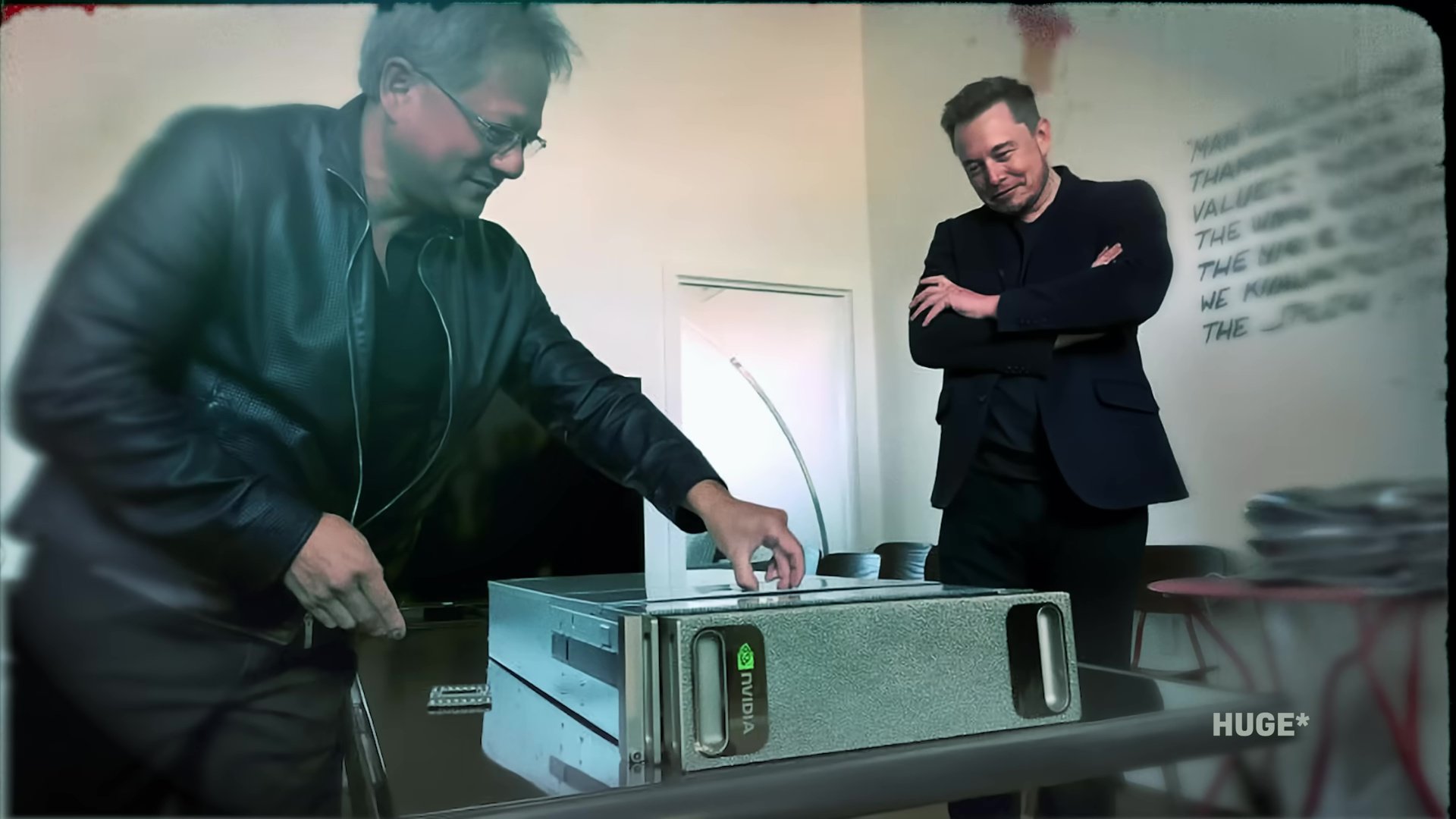
The very first version was DGX 1. I delivered to OpenAI in 2016, and that was $250,000. It had 10,000 times more power, more energy necessary than this version, and this version has six times more performance. I know, it's incredible. We're in a whole new world, and it's only since 2016.
Eight years later, we've increased the energy efficiency of computing by 10,000 times. Imagine if we became 10,000 times more energy efficient, or if a car was 10,000 times more energy efficient, or an electric light bulb was 10,000 times more energy efficient. Our light bulb would be right now, instead of 100 Watts, 10,000 times less, producing the same illumination.
The energy efficiency of computing, particularly for AI computing that we've been working on, has advanced incredibly, and that's essential because we want to create more intelligent systems, and we want to use more computation to be smarter. So energy efficiency to do the work is our number one priority.
How does NVIDIA make big bets on specific chips (transformers)?

When I was preparing for this interview, I spoke to a lot of my engineering friends, and this is a question that they really wanted me to ask. So you're really speaking to your people here. You've shown a value of increasing accessibility and abstraction, with CUDA, and allowing more people to use more computing power in all kinds of other ways.
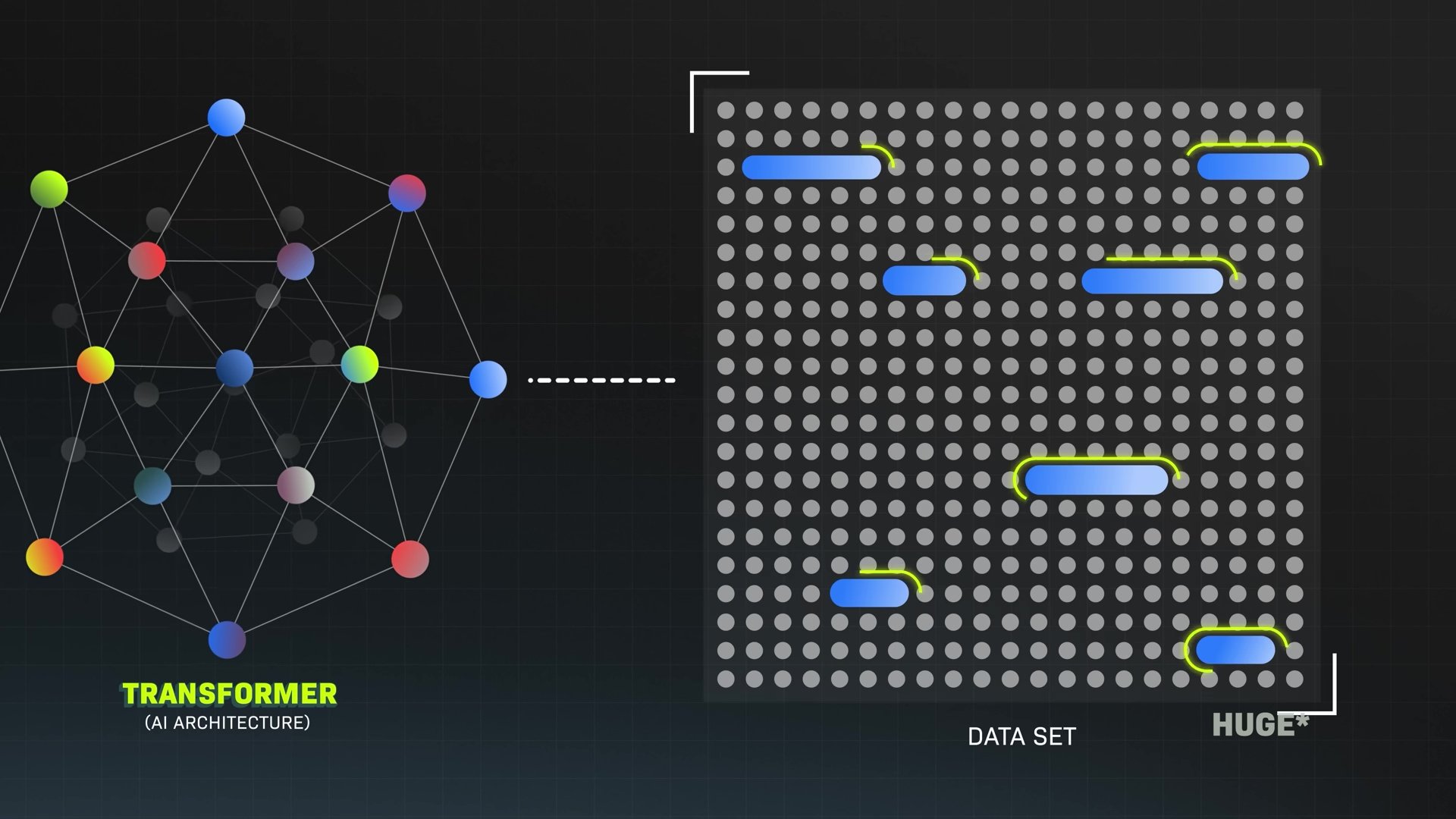
As applications of technology get more specific, I'm thinking of transformers in AI, for example. For the audience, a transformer is a very popular, more recent structure of AI that's now used in a huge number of the tools that you've seen. The reason that they're popular is because transformers are structured in a way that helps them pay attention to key bits of information and give much better results.
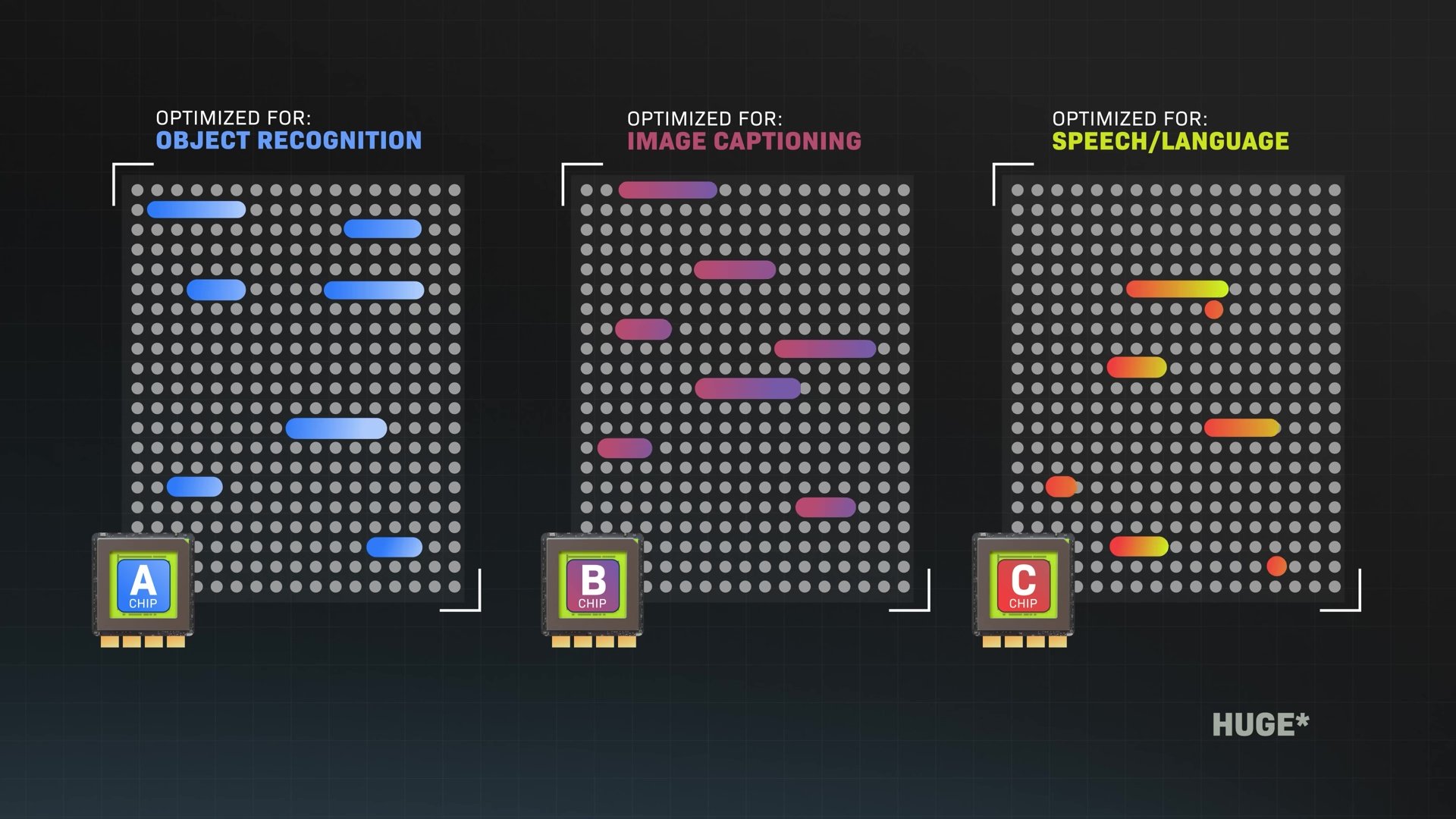
You could build chips that are perfectly suited for just one kind of AI model, but if you do that, then you're making them less able to do other things. As these specific structures or architectures of AI get more popular, my understanding is there's a debate between how much you place these bets on burning them into the chip, or designing hardware that is very specific to a certain task versus staying more general.
My question is, how do you make those bets? How do you think about whether the solution is a car that could go anywhere or optimizing a train to go from A to B? You're making bets with huge stakes, and I'm curious how you think about that.
That now comes back to exactly your question: what are your core beliefs?
The core belief is either that transformer is the last AI algorithm, AI architecture that any researcher will ever discover again, or that transformers is a stepping stone towards evolutions of transformers that are barely recognizable as a transformer years from now. We believe the latter.
The reason for that is because you just have to go back in history and ask yourself, in the world of computer algorithms, in the world of software, in the world of engineering and innovation, has one idea stayed along that long? The answer is no, and that's kind of the beauty.
That's, in fact, the essential beauty of a computer, that it's able to do something today that no one even imagined possible 10 years ago. If you had turned that computer 10 years ago into a microwave, then why would the applications keep coming?
So we believe in the richness of innovation and invention, and we want to create an architecture that lets inventors, innovators, software programmers, and AI researchers swim in the soup and come up with amazing ideas.
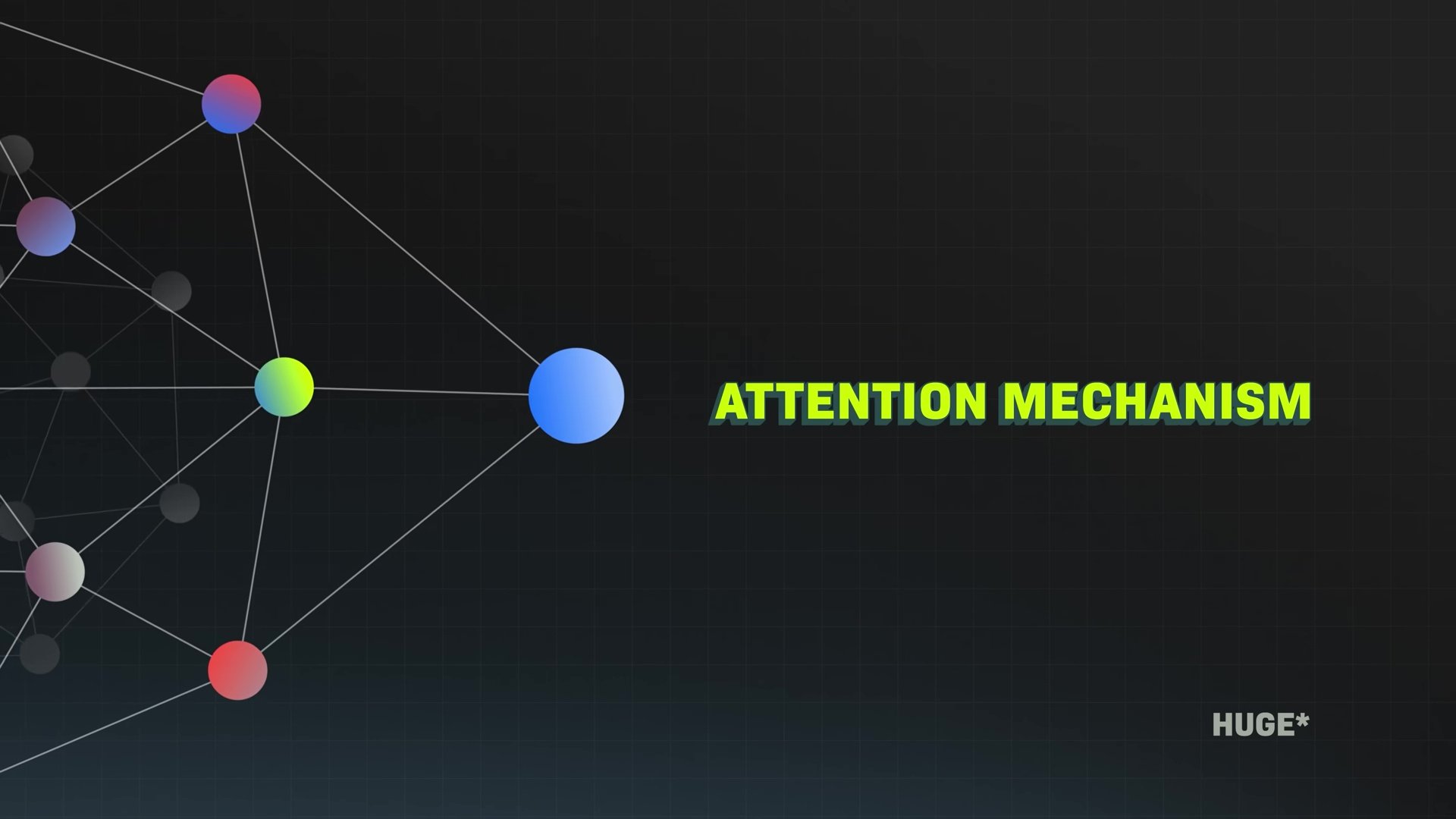
Look at transformers. The fundamental characteristic of a transformer is this idea called "attention mechanism," and it basically says the transformer is going to understand the meaning and the relevance of every single word with every other word. So if you had 10 words, it has to figure out the relationship across 10 of them.
But if you have 100,000 words, or if your context is now as large as reading a PDF and then reading a whole bunch of PDFs, and the context window is now like a million tokens, processing all of it across all of it is impossible.
So the way you solve that problem is there are all kinds of new ideas: flash attention, hierarchical attention, wave attention I just read about the other day.
The number of different types of attention mechanisms that have been invented since the transformer is quite extraordinary. I think that's going to continue, and we believe it's going to continue, and that computer science hasn't ended and that AI research has not all given up, and we haven't given up anyhow.
Having a computer that enables the flexibility of research and innovation and new ideas is fundamentally the most important thing.
How are chips made?
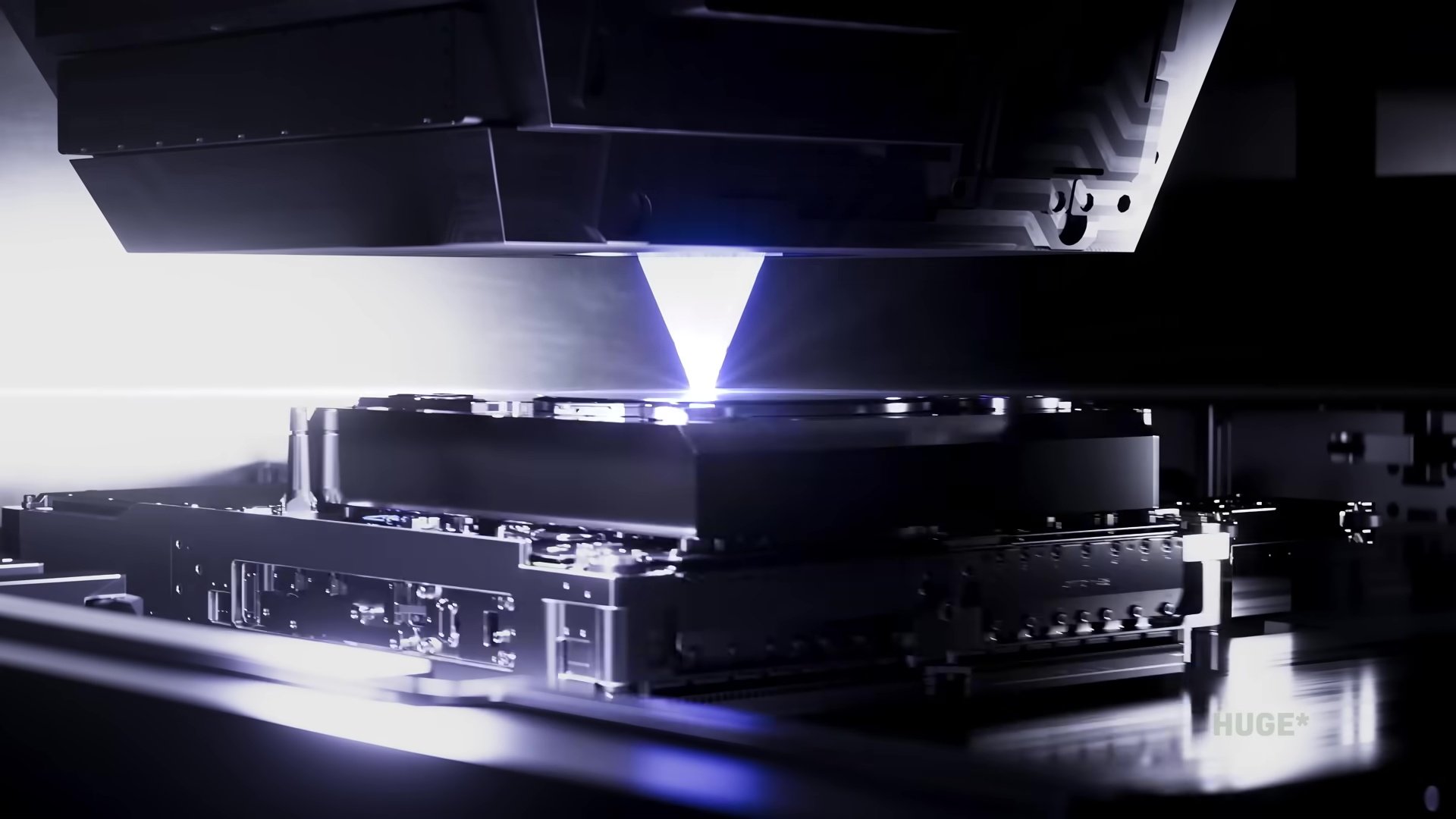
One of the incredible things that I am so curious about is that you design the chips. There are companies that assemble the chips. There are companies that design hardware to make it possible to work at nanometer scale.
When you're designing tools like this, how do you think about design in the context of what's physically possible right now to make? What are the things that you're thinking about with sort of pushing that limit today?
The way we do it is, even though our chips are made by TSMC, we assume that we need to have the deep expertise that TSMC has. So we have people in our company who are incredibly good at semiconductor physics so that we have a feeling for, we have an intuition for, what are the limits of what today's semiconductor physics can do.
We work very closely with them to discover the limits because we're trying to push the limits, and so we discover the limits together. We do the same thing in system engineering and cooling systems. It turns out plumbing is important to us because of liquid cooling, and maybe fans are important to us because of air cooling.
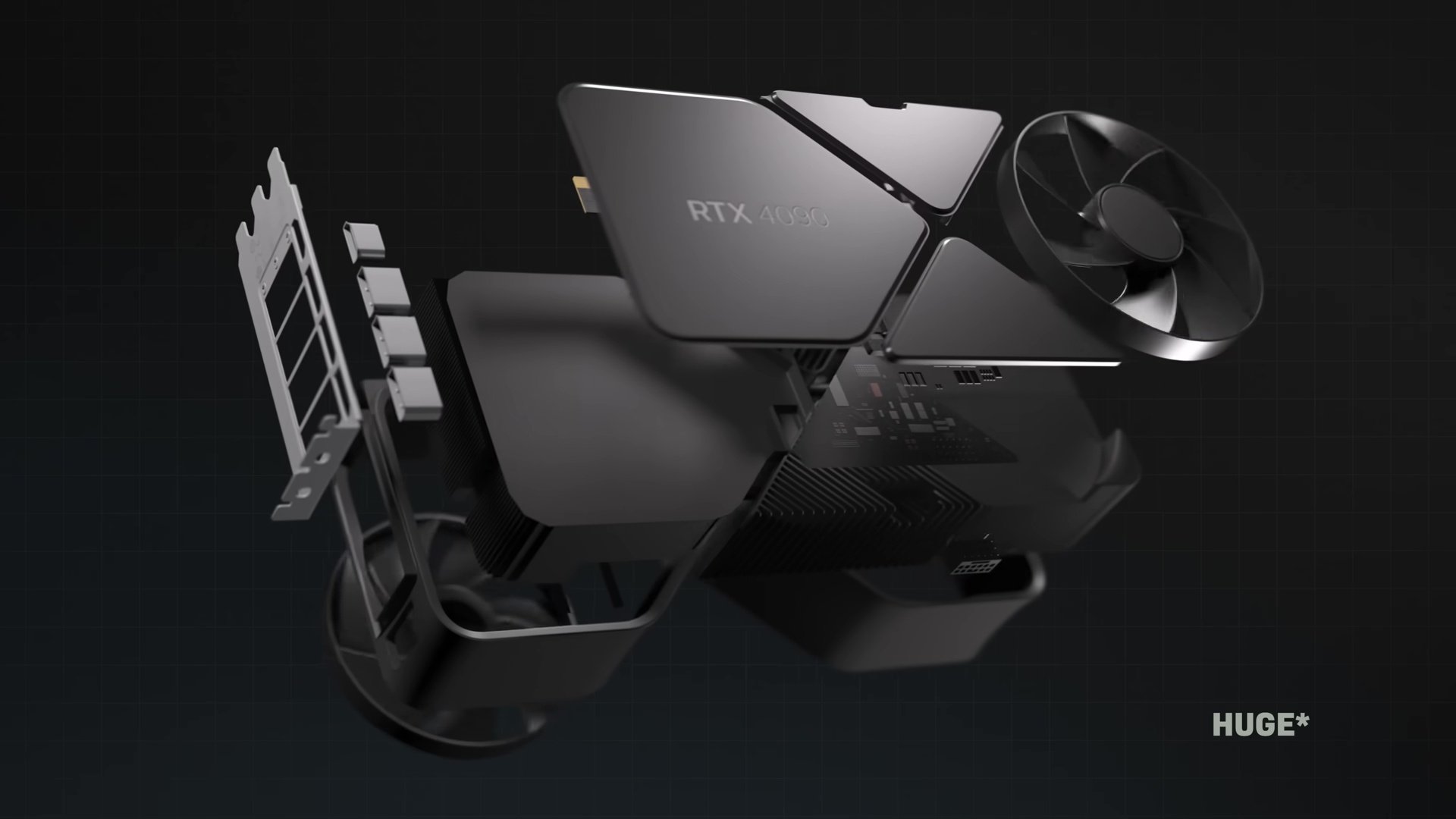
We're trying to design these fans in a way, almost like, you know, they're aerodynamically sound so that we could pass the highest volume of air, make the least amount of noise. So we have aerodynamics engineers in our company.
Even though we don't make them, we design them, and we have deep expertise in knowing how to have them made, and from that, we try to push the limits.
What’s Jensen’s next bet?

One of the themes of this conversation is that you are a person who makes big bets on the future, and time and time again, you've been right about those bets. We've talked about GPUs, we've talked about CUDA, we've talked about bets you've made in AI, self-driving cars, and we're going to be right on robotics.
This is my question: What are the bets you're making now?
The latest bet we just described at the CES, and I'm very proud of it and very excited about it, is the fusion of Omniverse and Cosmos so that we have this new type of generative world generation system, this multiverse generation system.
I think that's going to be profoundly important in the future of robotics and physical systems. Of course, the work that we're doing with human robots, developing the tooling systems and the training systems and the human demonstration systems, and all of this stuff that you've already mentioned, we're just seeing the beginnings of that work, and I think the next five years are going to be very interesting in the world of human robotics.

Of course, the work that we're doing in digital biology so that we can understand the language of molecules and understand the language of cells, just as we understand the language of physics and the physical world, we'd like to understand the language of the human body and understand the language of biology. If we can learn that, and we can predict it, then our ability to have a digital twin of the human is plausible.

I'm very excited about that work. I love the work that we're doing in climate science, being able to understand and predict, from weather predictions, the high-resolution regional climates, the weather patterns within a kilometer above your head. That we can somehow predict that with great accuracy, its implications are really profound.
So the number of things that we're working on is really cool. We're fortunate that we've created this instrument that is a time machine, and we need time machines in all of these areas that we just talked about so that we can see the future.
If we could see the future and we can predict the future, then we have a better chance of making that future the best version of it.
That's the reason why scientists want to predict the future. That's the reason why we try to predict the future and everything that we try to design so that we can optimize for the best version.
How should people prepare for this future?

If someone is watching this, and maybe they came into this video knowing that NVIDIA is an incredibly important company but not fully understanding why or how it might affect their life, and they're now hopefully better understanding a big shift that we've gone through over the last few decades in computing, this very exciting, very strange moment that we're in right now, where we're on the precipice of so many different things.
If they would like to be able to look into the future a little bit, how would you advise them to prepare or to think about this moment that they're in personally with respect to how these tools are actually going to affect them?
There are several ways to reason about the future that we're creating. One way to reason about it is, suppose the work that you do continues to be important, but the effort by which you do it went from being a week long to almost instantaneous.
The effort of drudgery basically goes to zero. What is the implication of that? This is very similar to what would change if all of a sudden we had highways in this country.
That kind of happened in the last Industrial Revolution. All of a sudden, we have interstate highways, and when you have interstate highways, what happens?
Suburbs start to be created, and all of a sudden, distribution of goods from east to west is no longer a concern, and all of a sudden, gas stations start cropping up on highways, and fast food restaurants show up, and motels show up because people traveling across the state, across the country, just wanted to stay somewhere for a few hours or overnight.
All of a sudden, new economies and new capabilities, new economies. What would happen if a video conference made it possible for us to see each other without having to travel anymore? All of a sudden, it's actually okay to work further away from home and from work; work and live further away. So you ask yourself these questions.
What would happen if I have a software programmer with me all the time, and whatever I can dream up, the software programmer could write for me?
What would happen if I just had a seed of an idea, and I rough it out, and all of a sudden a prototype of a production was put in front of me? How would that change my life and how would that change my opportunity?
What does it free me to be able to do, and so on.
How does this affect people’s jobs?
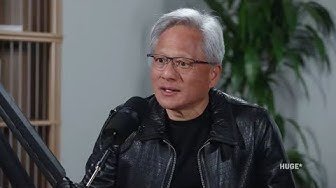
So I think the next decade, intelligence, not for everything, but for some things, would basically become superhuman. But I can tell you exactly what that feels like. I'm surrounded by superhuman people, super-intelligence from my perspective, because they're the best in the world at what they do, and they do what they do way better than I can do it.
I'm surrounded by thousands of them, and yet, not one day did it cause me to think I'm no longer necessary. It actually empowers me and gives me the confidence to go tackle more and more ambitious things.
So suppose now everybody is surrounded by these super AIs that are very good at specific things or good at some of the things.
What would that make you feel? It's going to empower you; it's going to make you feel confident, and I'm pretty sure you probably use ChatGPT and AI, and I feel more empowered today, more confident to learn something today.
The knowledge of almost any particular field, the barriers to that understanding, it has been reduced, and I have a personal tutor with me all the time.
So I think that feeling should be universal. If there's one thing I would encourage everybody to do, it's to go get yourself an AI tutor right away.
That AI tutor could, of course, just teach you things, anything you like, help you program, help you write, help you analyze, help you think, help you reason.
All of those things are going to really make you feel empowered, and I think that's going to be our future. We're going to become superhumans, not because we have super. We're going to become superhumans because we have super AIs.
GeForce RTX 50 Series and NVIDIA DGX

Could you tell us a little bit about each of these objects? This is a new GeForce graphics card, and yes, this is the RTX 50 Series. It is essentially a supercomputer that you put into your PC, and we use it for gaming.
Of course, people today use it for design and creative arts, and it does amazing AI. The real breakthrough here, and this is truly an amazing thing, GeForce enabled AI, and it enabled Geoff Hinton, Ilya Sutskever, and Alex Krizhevsky to be able to train AlexNet.
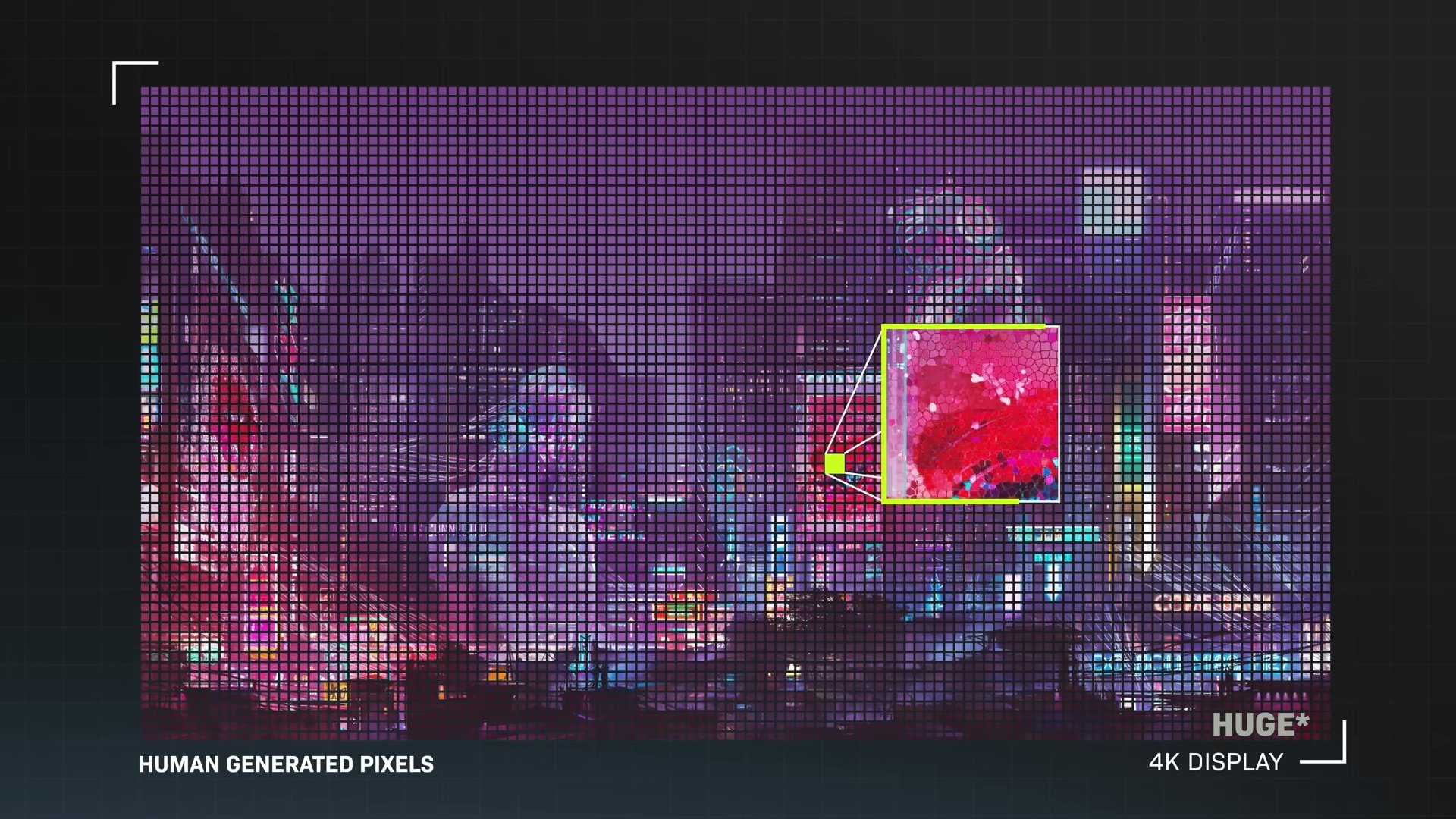
We discovered AI, and we advanced AI, then AI came back to GeForce to help computer graphics. So here's the amazing thing: out of 8 million pixels or so in a 4K display, we are computing, we're processing only 500,000 of them. The rest of them, we use AI to predict.
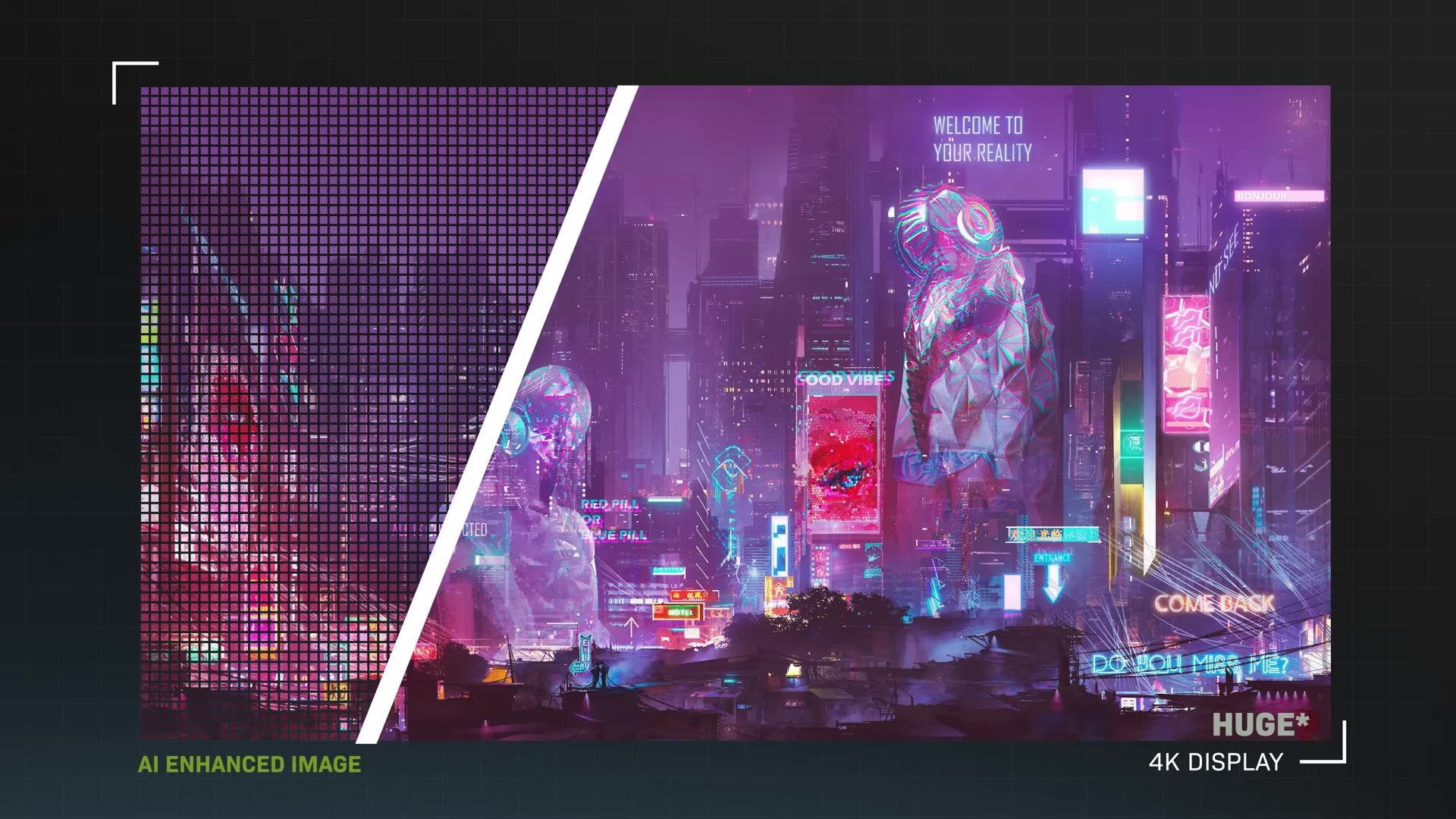
The AI guessed it, and yet the image is perfect. We inform it by the 500,000 pixels that we computed, and we ray-traced every single one, and it's all beautiful. It's perfect. Then we tell the AI, if these are the 500,000 perfect pixels in this screen, what are the other 8 million? It fills in the rest of the screen, and it's perfect.
If you only have to do fewer pixels, are you able to invest more in doing that because you have fewer to do? So then the quality is better, so the extrapolation that the AI does... Exactly. Because whatever computing, whatever attention you have, whatever resources you have, you can place it into 500,000 pixels.
This is a perfect example of why AI is going to make us all superhuman because all of the other things that it can do, it'll do for us, allows us to take our time and energy and focus it on the really valuable things that we do.
So we'll take our own resource, which is energy intensive, attention intensive, and we'll dedicate it to the few 100,000 pixels, and use AI to superres, upres it to everything else.
So this graphics card is now powered mostly by AI, and the computer graphics technology inside is incredible as well.
This next one, as I mentioned earlier, in 2016, I built the first one for AI researchers, and we delivered the first one to OpenAI, and Elon was there to receive it.
This version, I built a mini version, and the reason for that is because AI has now gone from AI researchers to every engineer, every student, every AI scientist. AI is going to be everywhere, so instead of these $250,000 versions, we're going to make these $3,000 versions, and schools can have them, students can have them.
You set it next to your PC or Mac, and all of a sudden, you have your own AI supercomputer, and you could develop and build AIs. Build your own AI, build your own R2-D2.
What’s Jensen’s advice for the future?

What do you feel is important for this audience to know that I haven't asked?
One of the most important things I would advise, for example, if I were a student today, the first thing I would do is learn AI.
How do I learn to interact with ChatGPT? How do I learn to interact with Gemini Pro? How do I learn to interact with Grok? Learning how to interact with AI is not unlike being someone who is really good at asking questions. You're incredibly good at asking questions, and prompting AI is very similar.
You can't just randomly ask a bunch of questions, so asking an AI to be an assistant to you requires some expertise and artistry in how to prompt it.
If I were a student today, irrespective of whether it's for math, science, chemistry, biology, or doesn't matter what field of science I'm going to go into or what profession, I'm going to ask myself, how can I use AI to do my job better?
If I want to be a lawyer, how can I use AI to be a better lawyer? If I want to be a doctor, how can I use AI to be a better doctor? If I want to be a chemist, how do I use AI to be a better chemist? If I want to be a biologist, how do I use AI to be a better biologist? That question should be persistent across everybody.
Just as my generation grew up as the first generation that had to ask ourselves, how can we use computers to do our jobs better? The generation before us had no computers. My generation was the first generation that had to ask the question, how do I use computers to do my job better?
Remember, I came into the industry before Windows 95, in 1984; there were no computers in offices.
Shortly after that, computers started to emerge, so we had to ask ourselves, how do we use computers to do our jobs better? The next generation doesn't have to ask that question, but it has to ask the next question: how can I use AI to do my job better? That is the start and finish, I think, for everybody.
It's a really exciting and scary, and therefore worthwhile question, I think, for everyone.
I think it's going to be incredibly fun. AI is a word people are just learning now, but it has made computers so much more accessible.
It is easier to prompt ChatGPT and ask it anything you like than to do the research yourself. We've lowered barriers of understanding, knowledge, and intelligence. Everyone needs to just go try it.
The really crazy thing is, if I put a computer in front of someone who has never used one, there's no chance they'll learn it in a day; someone really has to show them. Yet, with ChatGPT, if you don't know how to use it, all you have to do is type, "I don't know how to use ChatGPT, tell me."
It will come back and give you some examples, which is amazing. The amazing thing about intelligence is that it will help you along the way and make you superhuman.
How does Jensen want to be remembered?

I have one more question if you have a second. This isn't something I planned to ask, but on the way here, I was a little bit afraid of planes, which isn't my most reasonable quality. The flight here was very bumpy, and I was sitting there, thinking about what they were going to say at my funeral. I hoped the tombstone would say, "She asked good questions" and that I loved my husband, friends, and family.
The thing I hoped they would talk about was optimism; I hoped they would recognize what I'm trying to do here. I'm very curious about you, as you've been doing this a long time. It feels like there's so much you've described in this vision ahead. What would be the theme you'd want people to say about what you're trying to achieve?
Very simply, they made an extraordinary impact. I think we're fortunate because of some core beliefs we established a long time ago. By sticking with those core beliefs and building upon them, we find ourselves today as one of the many most important and consequential technology companies in the world, and potentially ever.
We take that responsibility very seriously, working hard to ensure the capabilities we've created are available to large companies as well as individual researchers and developers.
This applies across every field of science, no matter if it's profitable or not, big or small, famous or otherwise. It's because of this understanding of the consequential work we're doing and the potential impact it has on so many people that we want to make this capability as pervasive as possible. I do think that when we look back in a few years, the next generation will realize a few things.
First, they're going to know us because of all the gaming technology we create. I believe we'll look back and see that the entire field of digital biology and life sciences has been transformed. Our whole understanding of material sciences has been completely revolutionized.
Robots are helping us do dangerous and mundane things everywhere. If we want to drive, we can, but otherwise, we can take a nap or enjoy our car like it's a home theater. You can read from work to home, and at that point, you're hoping you live far away so you can be in a car longer. You'll look back and realize there's this company almost at the epicenter of all of that.
It just so happens to be the company you grew up playing games with. I hope that's what the next generation learns.
Thank you so much for your time; I enjoyed it! I'm glad!